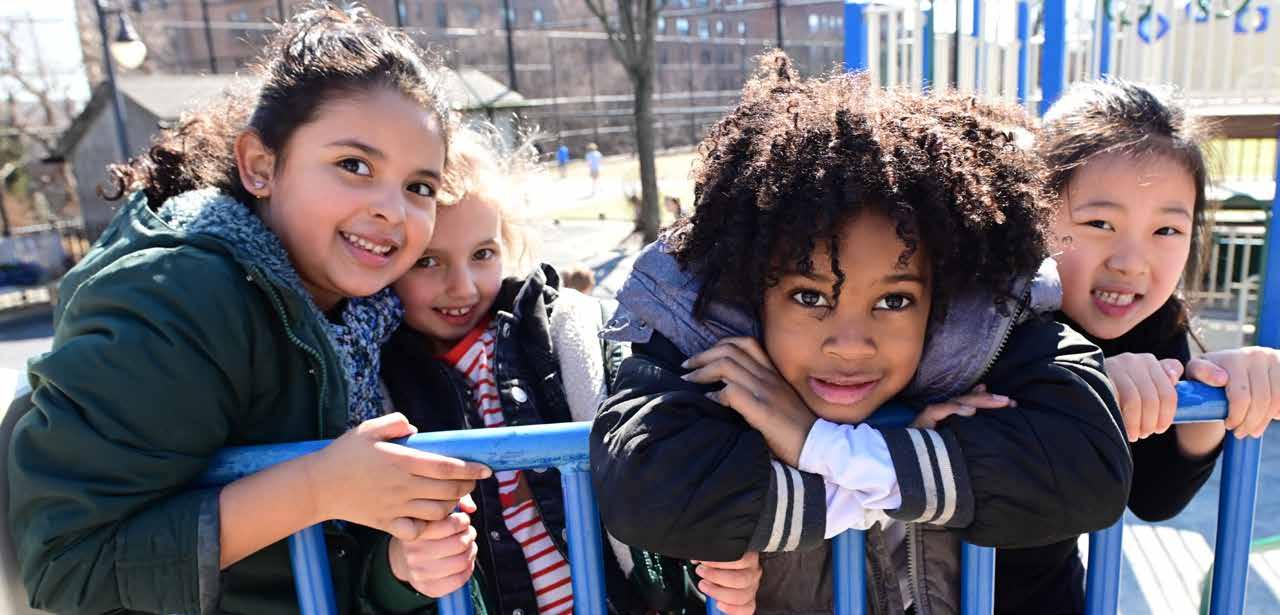ECFS Reporter
Ethical Culture Fieldston School Magazine
2024–2025 Academic Year


Ethical Culture Fieldston School Magazine
2024–2025 Academic Year

How STEM education at ECFS prepares students for a lifetime of leadership
Cultivating Critical Thinking and Research Skills in Our Classrooms
To Last Renovating our campuses
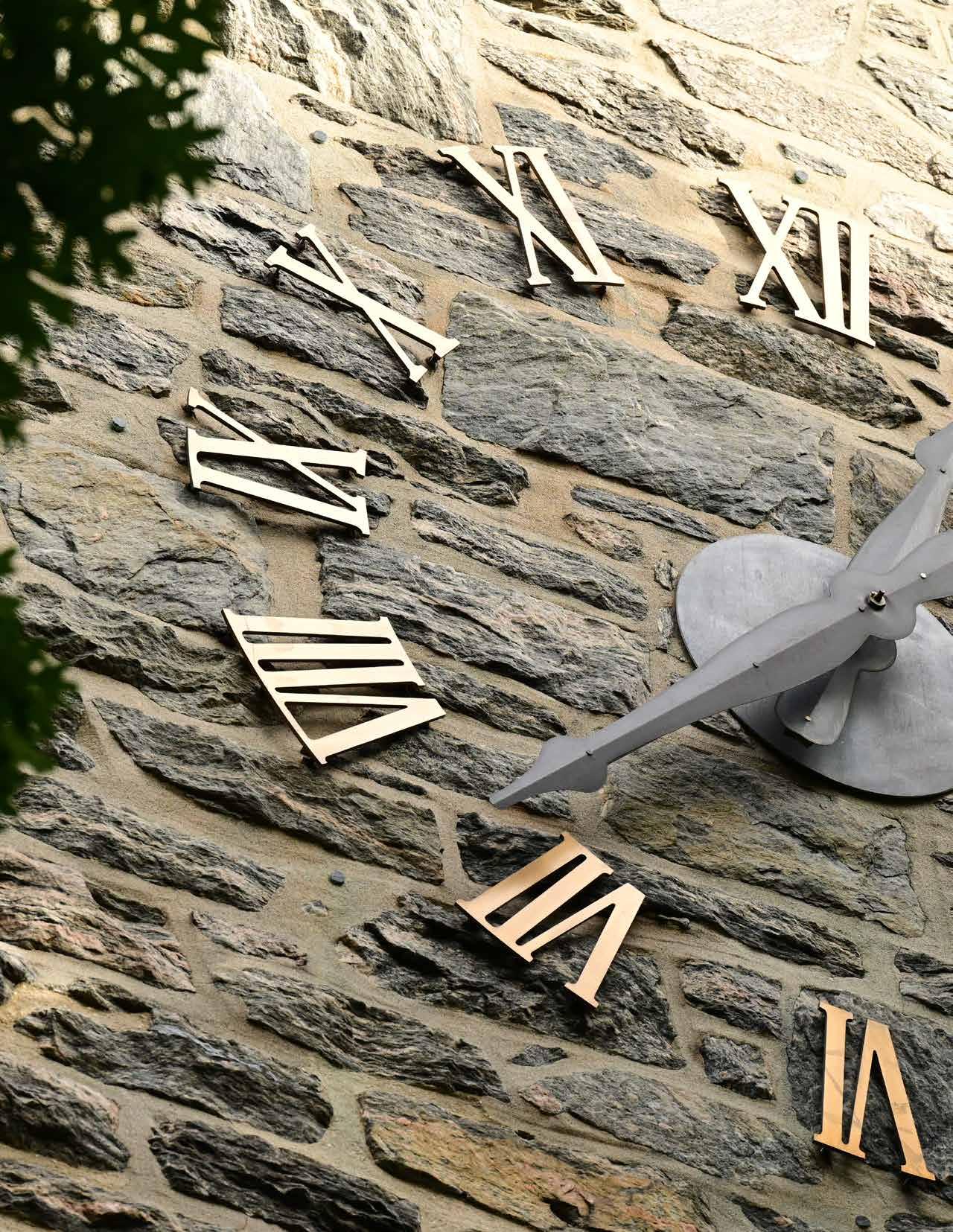
Contact communications@ecfs.org with feedback, questions, or ideas.
Follow along with stories from the School to stay up to date on all the exciting things happening at ECFS. Browse articles and photo galleries on our website and follow us on social media to see the latest updates.
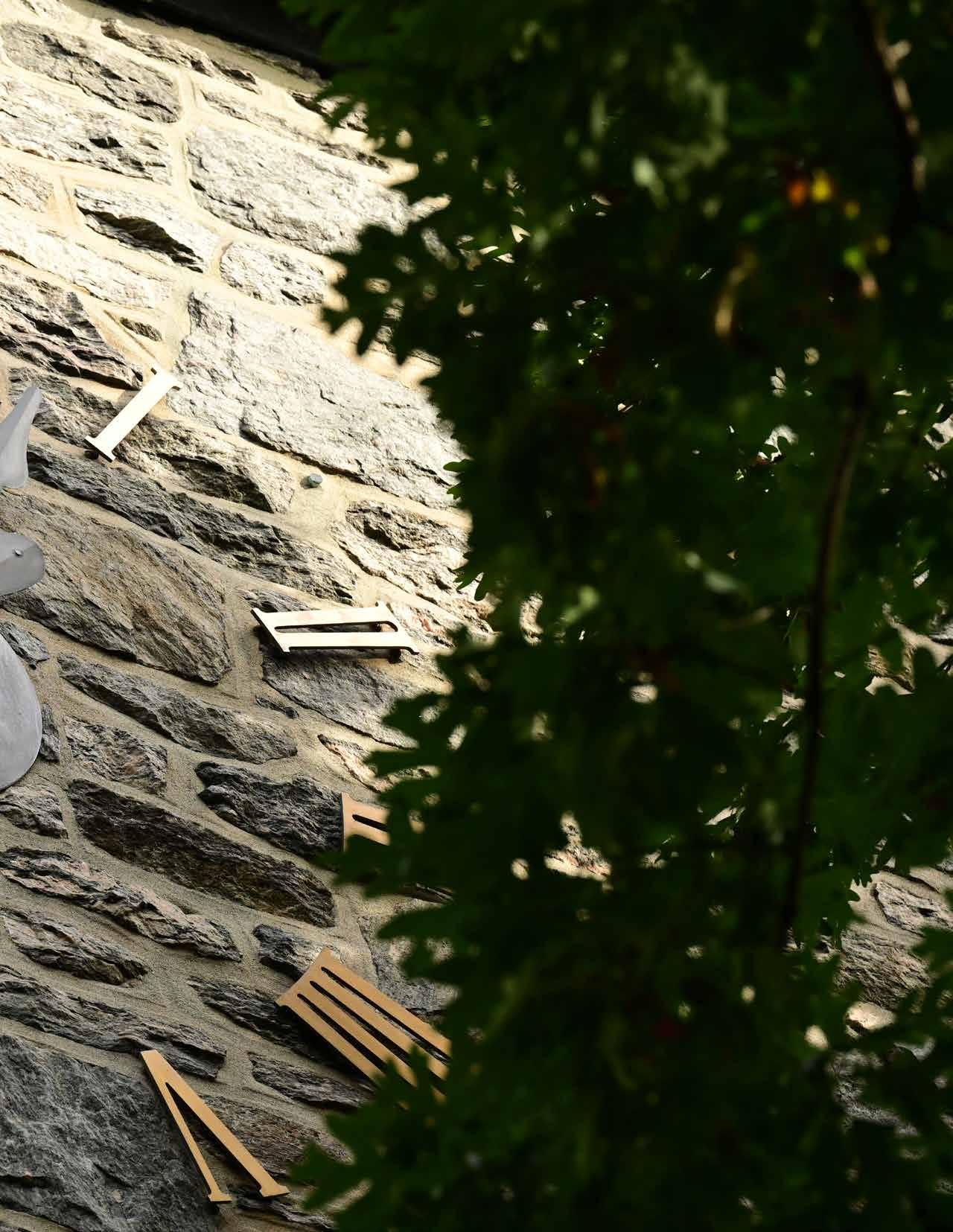
www.ecfs.org/news @ecfs1878
ethical-culture-fieldston-school @ecfs1878 @ecfs1878
2024–2025
Kyle Wilkie-Glass
Chief Executive Officer
Jon Alschuler
Principal, Fieldston Middle
Dave Argenzio
Director of Campus Safety
Stacey Bobo
Principal, Fieldston Upper
Kavita Bordia
Director of Development
Jetty Castro
Director of Human Resources
Victoria Daley
Director of Enrollment Management and Financial Aid
Les Jonson
Executive Director of Technology
Erik Landgren
Principal, Ethical Culture
Robert Lundgren
Director of Facilities
Holly Manges Jones
Chief Human Resources Officer and General Counsel
Shannon Matlovsky
Executive Director of Belonging and Social Impact
Joe McCauley
Principal, Fieldston Lower
Mica McGriggs
Executive Director of Student Support and Wellness
Gus Ornstein ’94
Director of Athletics
Teddy O’Rourke
Executive Director of Operations
Francesca Pisa
Executive Director of Teaching and Learning
Renée Reid-Nicholson
Director of Communications
Keiko Reid
Chief Financial Officer
Rose Turshen
Interim Chief Advancement Officer
Akosua Yeboah
Director of College Counseling
2024–2025
Fahim Ahmed
Dana Baxter ’88
Ethan Binder
Margot Bridger
Anand Desai
Akin Dorsett ’88
Sharan Gill
Andrew Holm ’01
Atif Khawaja Chair
Rob Lewin
Vivian Lin
Seth Meisel
Jo Natauri
Kathleen O’Connell
Palma Repole
Carline Samson
Dana Sirota
Min Young Song
Lance Taubin ’06
Krishna Veeraraghavan
Rielly Vlassis
Josh Vlasto ’00
Stephanie Wagner
Grace Wang
Kyle Wilkie-Glass
Chief Executive Officer, Ex Officio
Liz Singer
President, Society Board, Ex Officio
ECFS Communications Office
Liv Garcia
Communications Manager
Gina Iacono
Graphic Design and Website Manager
Emma Johnson
Assistant Director of Communications
Kristen Perrone
Communications Manager
Renée Reid-Nicholson
Director of Communications
Carl Smith
Fieldston Press Design Director and Visual Arts Faculty
Contributors
Vinni Drybala, photographer
Dana Maxson, photographer
Anne Mottola, photographer
Jonathan Pellow, photographer
Al Pereira, photographer
Rose Press, printing
Chris Taggart, photographer
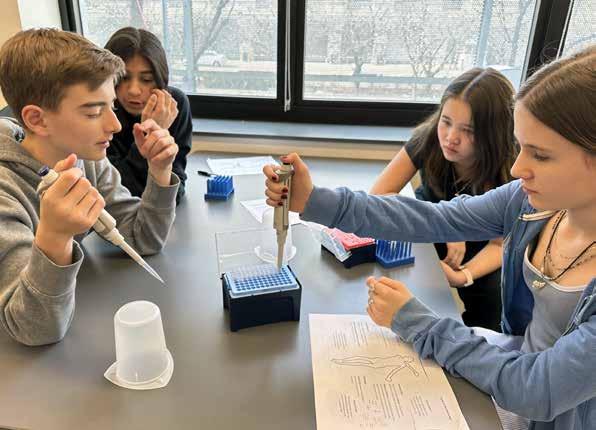

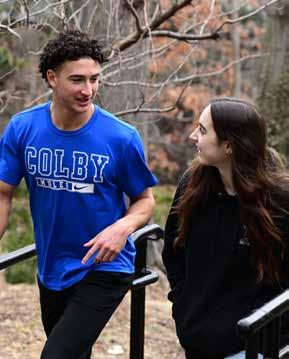


Dear ECFS community,
The stories within this year’s ECFS Reporter magazine encapsulate the remarkable year we have had at Ethical Culture Fieldston School and reflect the wonderfully transformative power of a progressive education model that broadens our students’ minds and shapes their futures.
Across our classrooms, our interdisciplinary approach lays a firm foundation for thoughtful and informed problem-solving and inspires students to think critically through hands-on learning. With faculty and staff support, students don’t just memorize content, but actively absorb and apply what they are learning to their everyday lives.
Our wide variety of programming sparks active discovery and ethical engagement through a rigorous, balanced, and forwardthinking curriculum. Students are designing climate-conscious structures, conducting lab research involving data analytics, building autonomous rovers using various code sequences, honing creative skills through the performing arts, and developing discipline and camaraderie on our athletics teams. In doing so, they become problem solvers who will successfully tackle the most difficult subject matter in the world beyond our classrooms.
As you read through this year’s Reporter, I’m confident you’ll experience the joy, passion, and innovation that animate our school community. These stories offer a glimpse into our mission-driven, ethics-based philosophy, where our students are learning to shape their futures and create the world they will soon lead. I hope you enjoy reading these stories as much as we enjoy telling them.
Warmly,
Kyle Wilkie-Glass P’37 Chief Executive Officer

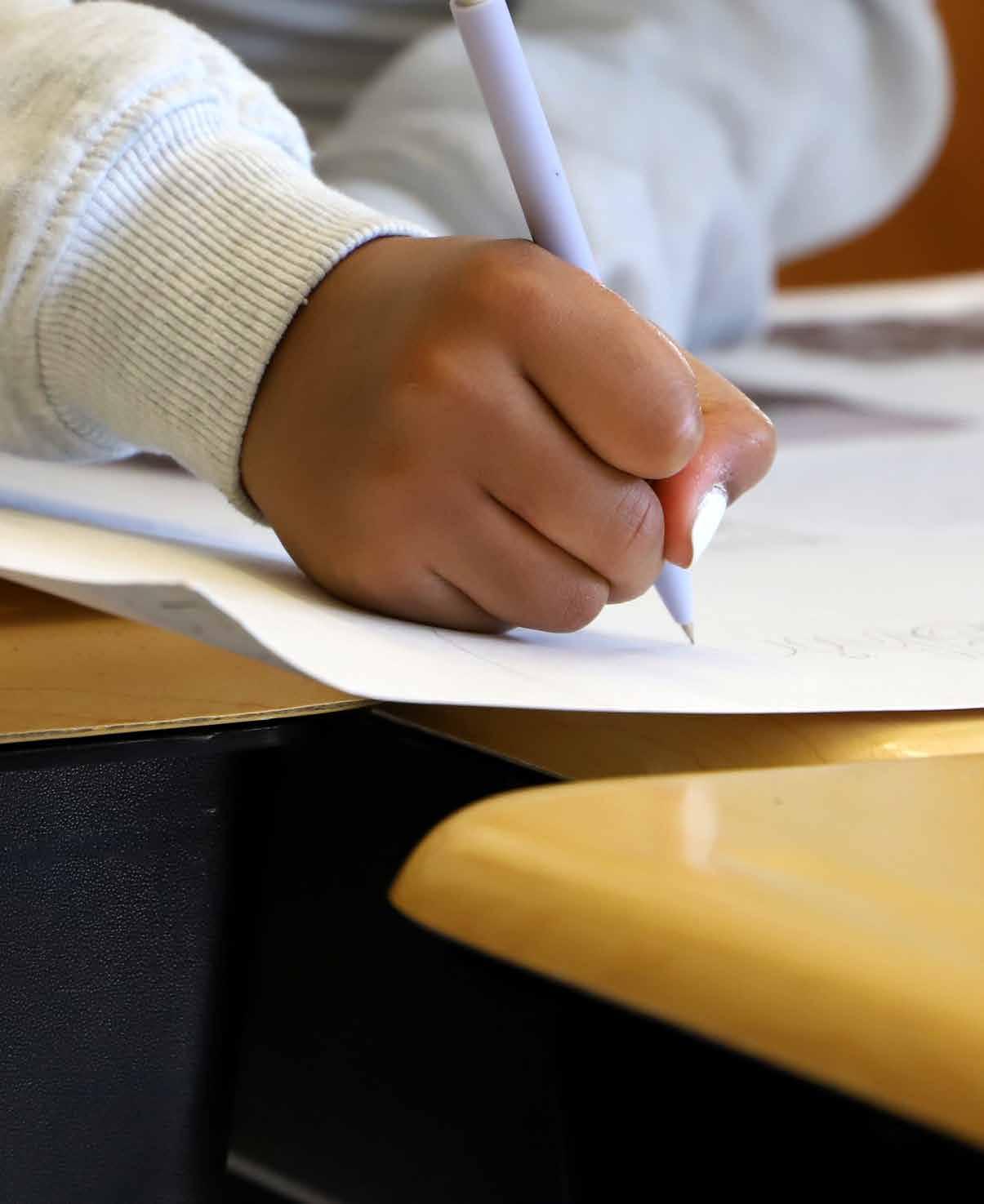
At ECFS, research is a critical academic discipline deeply rooted in our educational philosophy. Our teachers support students as they learn to find and evaluate information, synthesize ideas, and communicate findings, creating a foundation for thoughtful and informed problem-solving in academic and real-life contexts. We asked faculty members across all four divisions to share a bit about the projects, units, and activities that promote intellectual curiosity and most effectively cultivate strong, inquiry-driven research skills.
“The 1st Grade Central Park study is a wonderful opportunity for learners to engage in experiential and meaningful research grounded in their interests. Given the park’s proximity to our School, they begin the study by leveraging their personal experiences to define its attributes and features. Together, we generate questions and find answers using map skills, readings, and interactive maps filled with fascinating facts. Students practice note-taking and document their learning in journals, and to connect this research with real-life experiences, our research teams embark on field trips to the park.
The project truly comes to life when the concept of three-dimensional model-making is introduced as an alternative way to explore new learning. The 1st Graders join design teams and take turns working in the block area to build various landmarks in the park. Each year, the model evolves to reflect students’ interests. Some years, teams focus on populating the map with trees, while in other years, playgrounds take center stage. It’s always very exciting to see how student interest drives the study. Beyond sparking curiosity, the study strengthens research, observation, and documentation skills — critical tools they will continue to build on in future grades.
José Ramos 1st Grade Head Teacher, Ethical Culture
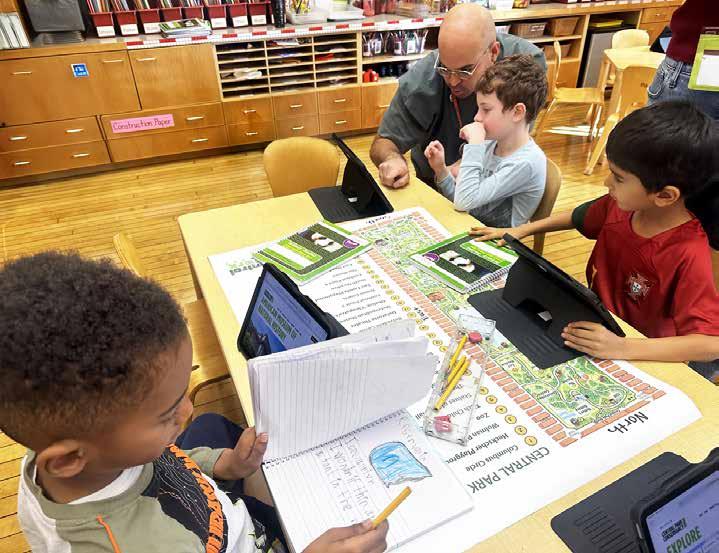
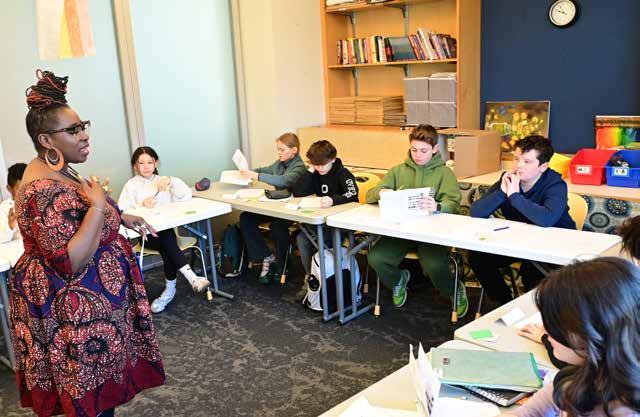
“The 6th Grade unit on the Delano California Grape Strike touches many tenets of ethical thinking, learning, and practice. We explore the questions that arise and connect us to our theme of building a healthy community. After watching two films that share different experiences of the actions leading to and sustaining the grape strike, students prepare for and participate in a seminar. On seminar day, each student has a packet containing photographs, quotes, personal reflections, and speeches that summarize the research we have assembled throughout the unit. Using their observations, interpretations, and best thinking, they explore the role of activists in building a healthy, more just community. The seminar concludes as everyone shares a closing statement about what they learned from their investigation and one another. Before the seminar, students ask questions, test their knowledge, write in their journals, explore interactive maps, draw, learn songs, and engage in thoughtful questions with one another.
This integrated approach strengthens critical thinking and helps students connect historical activism to the challenges of today. The atmosphere buzzes like a well-tended garden, which tracks well with the word seminar, whose root is the Latin word for seed.
Abena Koomson-Davis Ethics Department Chair, Fieldston Middle
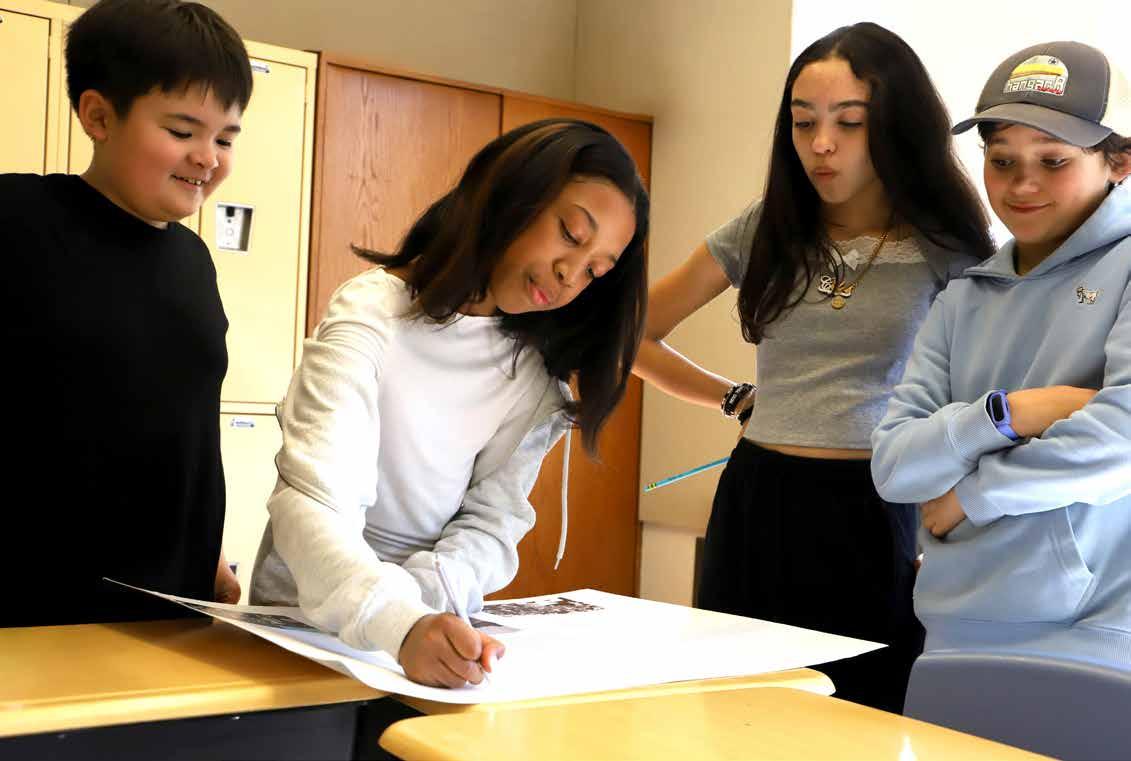
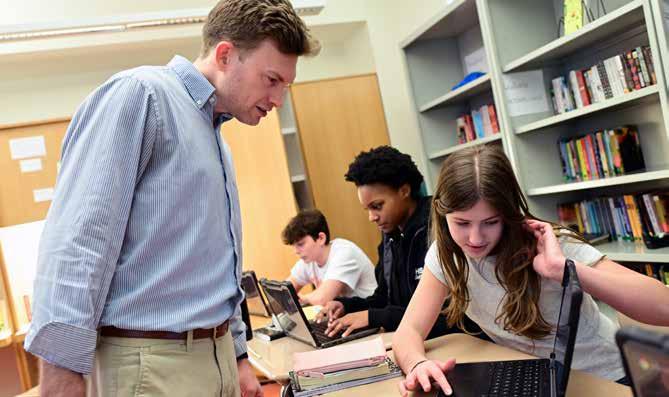
““The Harlem Renaissance ’zine project combines research, collage techniques based on Romare Bearden’s work, poetry the children have written about home, and illustrations highlighting a key figure from the Harlem Renaissance. ’Zines are made by hand, following a layout and design process. The ’zine project captures the spirit of the Harlem Renaissance: taking risks to create art for oneself and community with a ‘do-it-yourself’ approach that relies on community rather than hierarchical institutional systems. Students are especially engaged because they take ownership of both the research and the creative process, making their learning hands-on and meaningful.
Rebecca
Butler 5th Grade Head Teacher, Fieldston Lower
‘The Machine Stops,’ by E.M. Forster, is a thought-provoking novel first published in 1909 that imagines a future eerily like our present day, in which devices absorb our attention while we remain physically remote from each other, compulsively entertaining ourselves with various ‘social’ media while at the same time being peculiarly isolated, as if in our own private bubble. In reading the book, students can consider how this fictional world does and does not resemble their own experiences with technology.
The goals of this project are empowering students to pay attention to what seems to be underappreciated at Fieldston or in Middle School more generally and, also, imagining how students themselves as changemakers might improve our school community in specific ways.
Brad Fraver
English
Teacher, Fieldston Middle
The 11th Grade AT Calculus 1 class’s unit on differential equations challenges students to recognize how differential equations can be used to model and understand phenomena in other disciplines, bridging the gap between abstract mathematics and real-world applications. Students work in groups of two or three and can choose which application to research in depth. In the past, their choices included the SIR model used to model the spread of infectious diseases, modeling the effects of air resistance on falling objects, and peak oil and the consumption of natural resources. One of the key experiential learning takeaways of modeling is asking, ‘Can we make predictions from this model? Does it correspond to actual data? What can it teach us about this phenomenon?’

“ “Students complete a series of scaffolded questions that help them understand how mathematics connects to each topic. We also ask them to do background research to provide more context and, in the end, produce a written paper and give a short share-out to the class. The project relies on students being savvy and relying on rigorous research skills they’ve already developed in other classes.
Stephen Chu
Math Department Chair, Fieldston Upper

Our changemaker unit is a yearlong study of people who make the world a better place. As teachers, we introduce people from diverse backgrounds who impact their local community and beyond. We learn about adults, young people, and people from the past, incorporating historical figures who have significantly changed how we live in the world today. However, we also learn about inspiring people who are less familiar to students, bringing relevance to an unheard name that may not be so commonly spoken or someone not too distant from their community. Using real-life stories of those connected to social justice, environmental activism, and inclusivity, we hope that students see themselves as citizens of the world who can also forge a life of service and positive impact. To bookend our learning about changemakers, we scout community service projects every year so students can take action and be a voice for our Fieldston community well into the future.
Melanie Corcino and Monique Astengo-Rosen 2nd Grade Head Teachers, Fieldston Lower
“The evolution of students’ relationship to places familiar and unfamiliar in our city, as well as their ability to synthesize multiple physical and conceptual vantage points, culminates in our policy memos. In this group project, a semester’s worth of new perspectives — shaped through classroom study and hands-on fieldwork, including volunteering in community gardens and other local initiatives — is channeled into an in-depth exploration of a single policy subject and its implications for a specific neighborhood. The policy papers, which students spend several weeks immersing themselves in a single policy topic of their choice, are where we see the rigorous transformation that City Semester promises: from a clear moral vision to civic engagement. In Felix Adler’s famous words, the project ensures that students are ‘competent to change their environment to greater conformity with moral ideals.’
—
Roy Blumenfeld
City Semester Director, Fieldston Upper
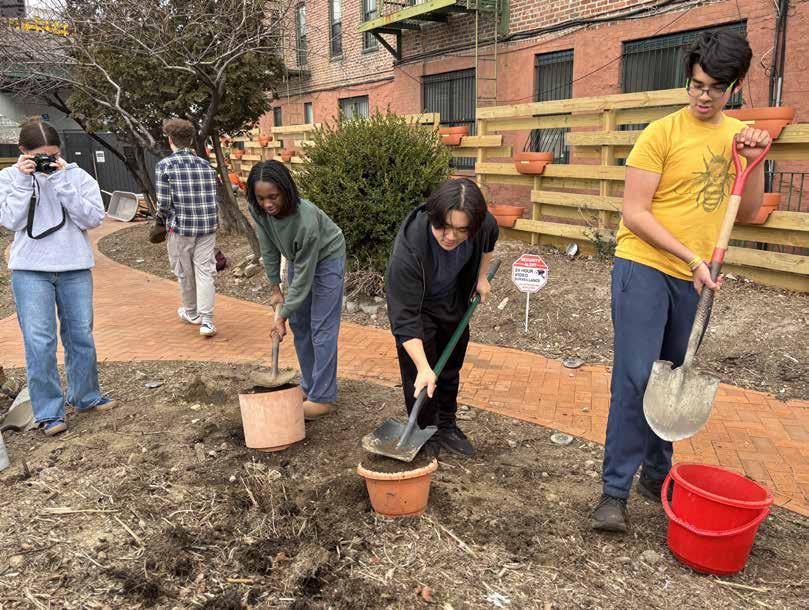
“One of my favorite classroom projects is our research unit on historical landmarks, such as Machu Picchu and the Great Pyramids of Giza. The students prepare for research through a series of lessons on nonfiction, including practicing selfmonitoring strategies such as chunking, annotating, and exploring text features. Working in small groups, they gather and organize key facts on their chosen landmark’s history, appearance, location, and significance using differentiated texts, videos, and other visual tools. Once they have collected this information, they are challenged to transform their research into structured, cohesive paragraphs. I love how seamlessly this experiential process strengthens their critical thinking skills while also reinforcing the value of revision. Later in the year, the project naturally transitions into independent research on prominent Indigenous figures, empowering them to apply their learning with greater autonomy.
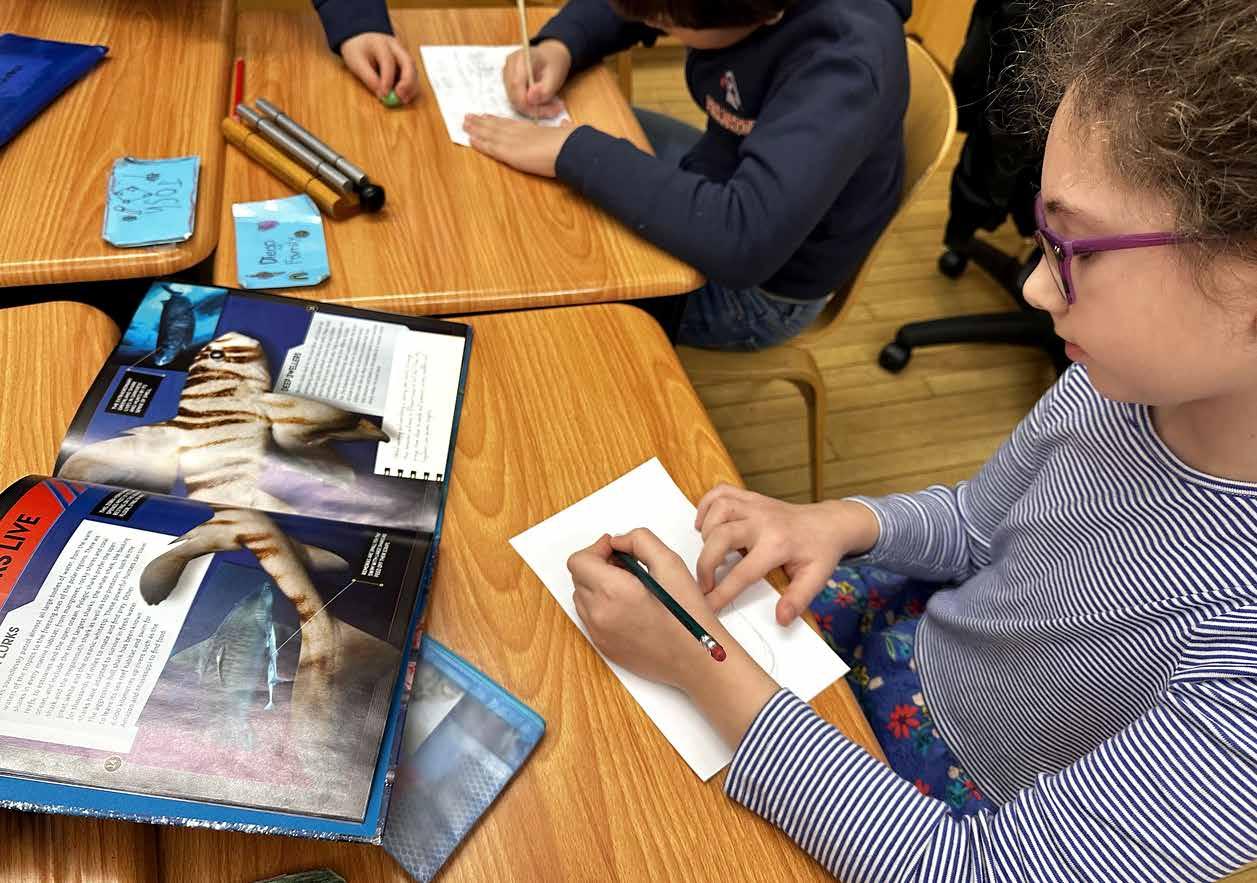
— Ty Yueng
3rd Grade Head Teacher, Ethical Culture
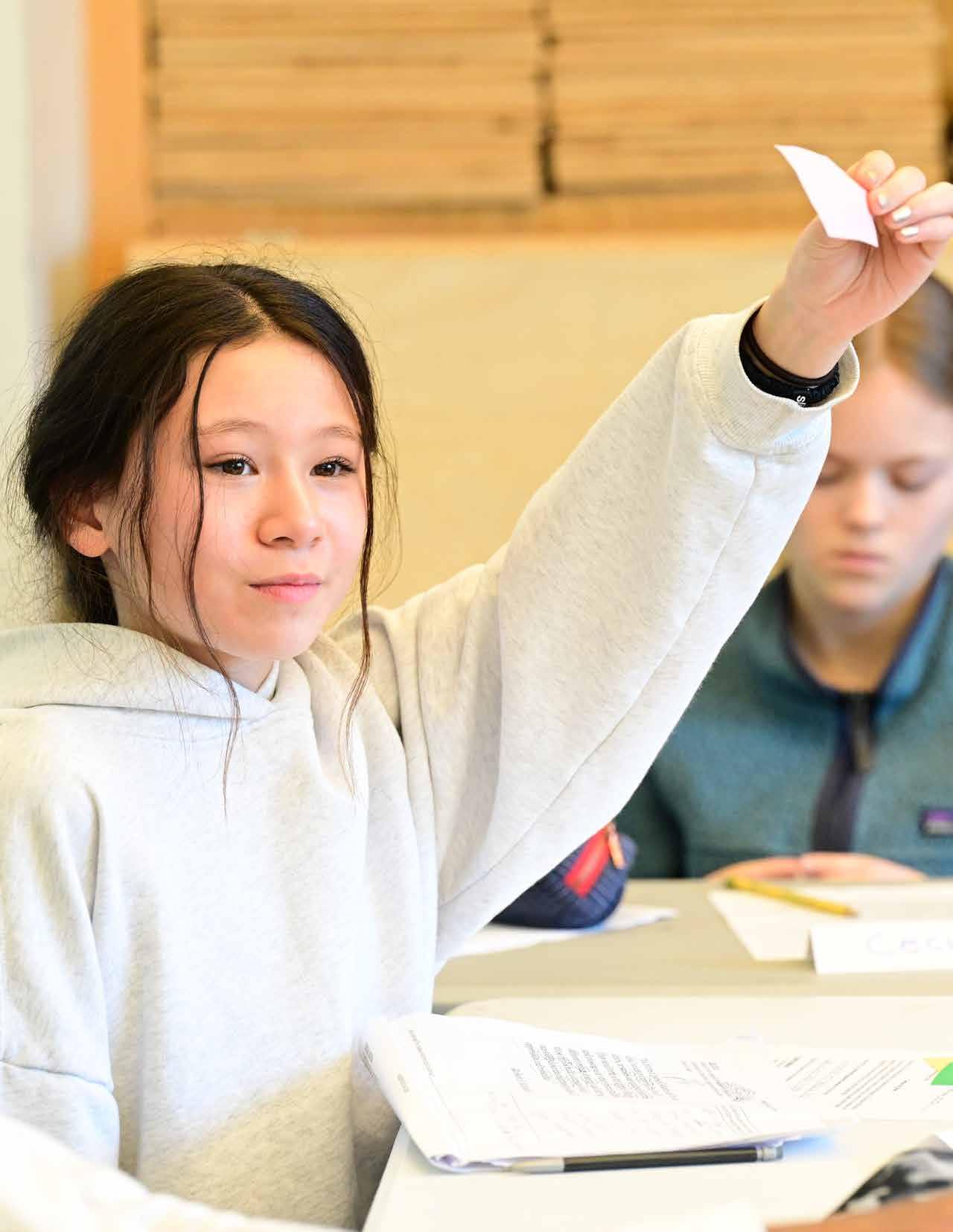

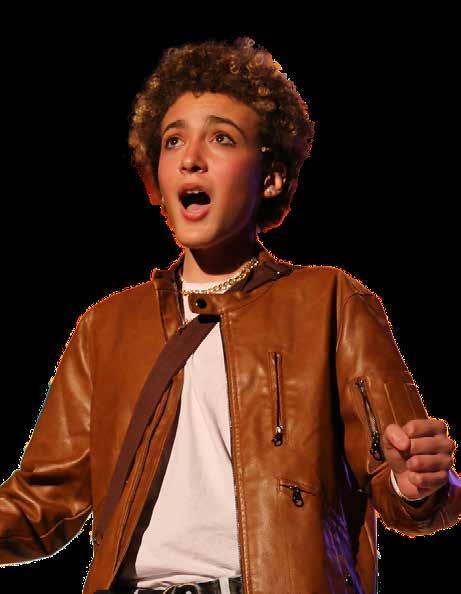

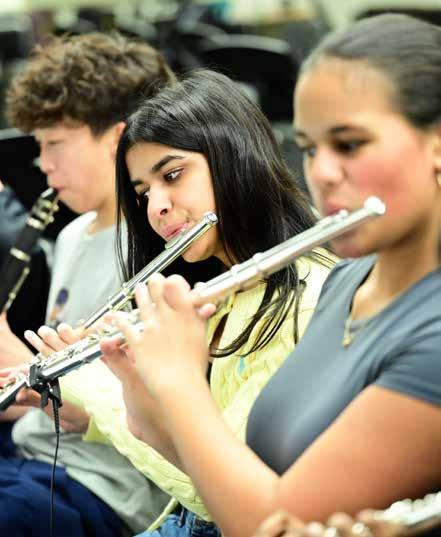
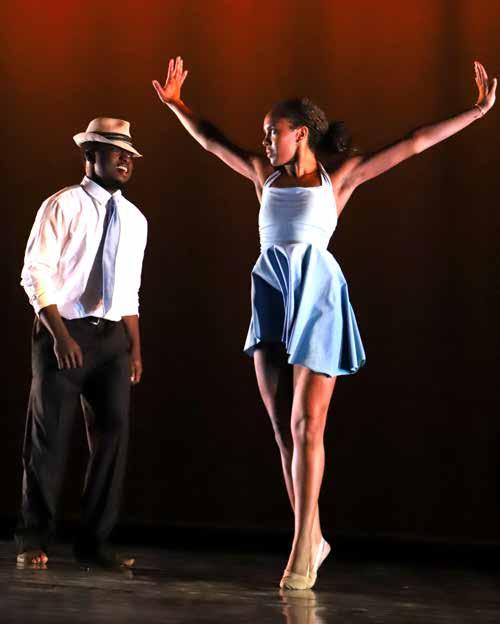

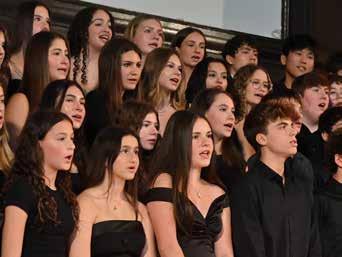
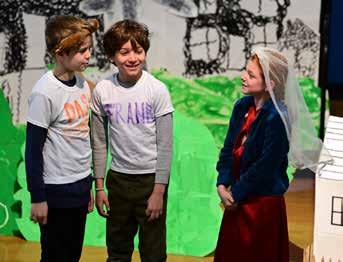







At ECFS, we welcome students into a creative community that spans all four divisions. Through their involvement in the performing arts — music, theatre, and dance — every Eagle has countless opportunities to express their creative side, developing skills that will serve them in any career or life path they choose.
Our youngest students at Ethical Culture and Fieldston Lower build a connection to the performing arts through collaboration inside the classroom and joyful community events. Many Ethical Culture graduates count the studentwritten 4th Grade play as one of their fondest memories, and Fieldston Lower students have been singing their school song, “A Place in the World,” at assemblies for years!
Fieldston Middle students use the performing arts to develop their rapidly evolving academic and social skills. As they play complex rhythms, sing in harmony, choreograph their peers, and support each other as scene partners, students also learn to analyze patterns, dive deeply into comprehending a text, and empathize with others.
When students arrive at Fieldston Upper, many have the chance to deepen their creative practice by taking on leadership roles as playwrights, choreographers, and directors. Noa S. ’25 considers the Theatre and Dance Department as an essential factor in her growth, remarking, “Fieldston theatre has pushed me out of my comfort zone and given me the space and support to explore my creativity both onstage and in the classroom.”
Whether it’s a project building instruments out of cardboard, taking to the stage at the Spring Dance Concert for a senior solo, or even returning as an alum playwright, ECFS students exemplify what an empowering and experiential performing arts curriculum looks like.





T S S T E E

Cover Story
At the Ethical Culture Fieldston School, science, technology, engineering, and math (STEM) education offers a dynamic testing ground for innovation, discovery, and ethical engagement. From their earliest years, our students engage with critical questions, grapple with complex ideas, and connect what they study in the classroom with the world at large. Whether they’re designing experiments in a biology lab, constructing climate-conscious structures, modeling lunar exploration, or discovering patterns in math, ECFS students are innovators and problemsolvers, tackling complex subject matter every day.
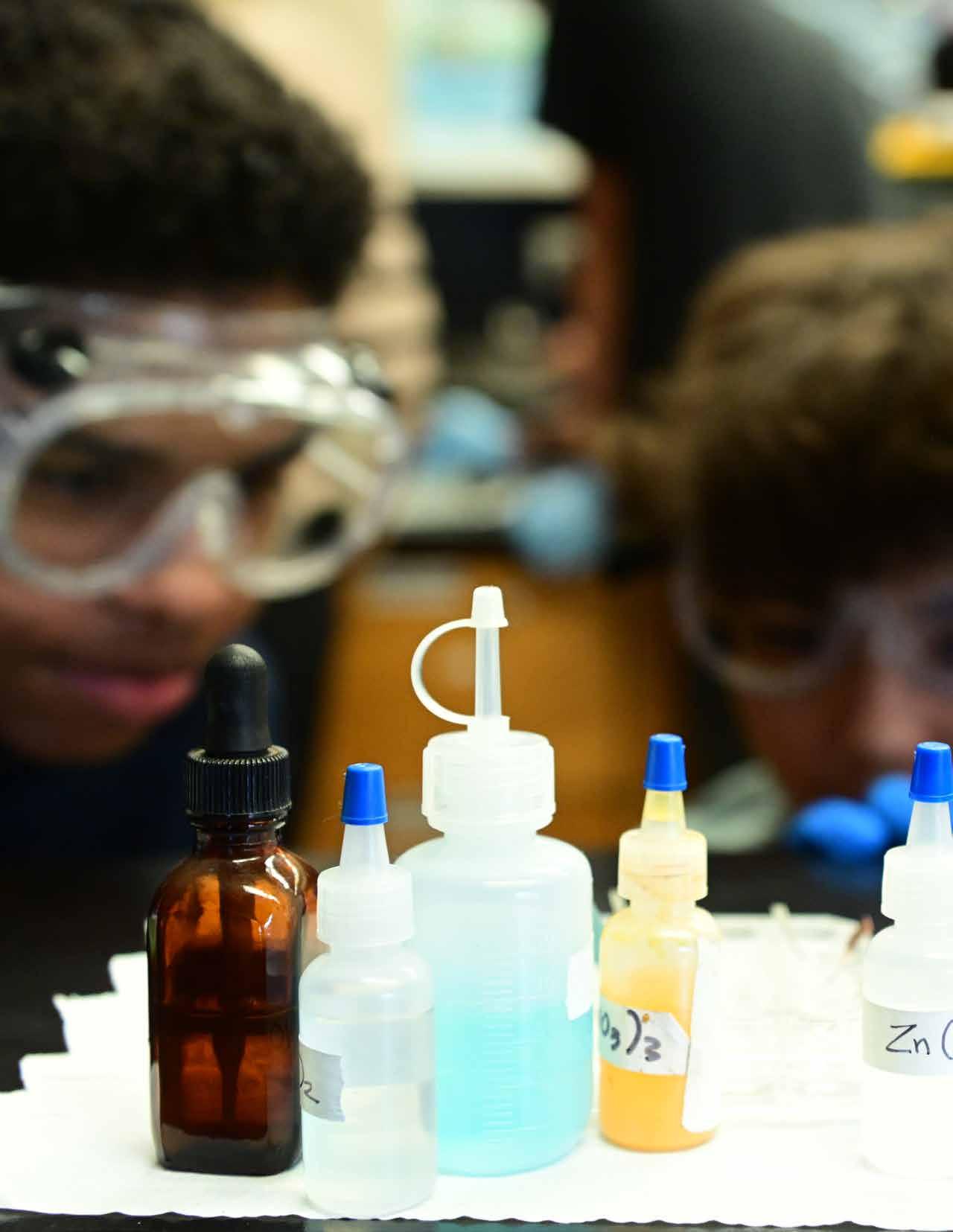

Students develop their scientific knowledge through yearlong lab courses and investigate specific disciplines with semesterlong electives designed by the Science Department. Laboratory courses emphasize hands-on experimentation, encouraging students to explore real-world applications and consider future paths in scientific research.
“The Science Department offers a sequence of introductory laboratory courses that emphasize the major subject areas in science and center on critical thinking and data analysis,” says Fieldston Upper Science Department Chair Paul Church. “These foundational courses prepare students to solve complex

explains. “We emphasize the ability to not only perform statistical analysis but also comprehend that analysis.”
Early exposure to rigorous laboratory practices often inspires students to pursue and apply for advanced research opportunities. The Fieldston Upper Science Research Program (FSRP) is designed for highly motivated independent learners who are eager to explore scientific research. Over the course of two to three years, and often including a summer research component, students accepted into the program familiarize themselves with advanced laboratory methods, experimental design, scientific writing, and data analysis. The program also encourages students to independently pursue research opportunities, honing their selfsufficiency and preparing them for the professional world.
“ I was the only high schooler in a room full of undergraduate and graduate students, but I was welcomed like any other co-worker, and that pushed me to contribute like one.
problems by providing them with the tools to examine and address complicated systems by taking into consideration multiple perspectives.”
What distinguishes the curriculum is how experiments grow in complexity and precision as students progress from biology to chemistry to physics, with each course building on prior knowledge in a logical and cumulative manner. In 9th Grade biology, students learn foundational topics such as cell biology, genetics, evolution, ecosystems, and human anatomy and become proficient in using lab tools, including probes to measure variables like carbon dioxide or oxygen concentrations.
“Each course introduces foundational concepts that are later expanded upon in greater depth, reinforcing scientific thinking and problem-solving skills,” Church
“Labs have always been my favorite part of science class,” says FSRP student Zachary L. ’26. “From pig dissections in biology to making aspirin in chemistry, I always got a lot out of the lab portion. My love for experiments is what pushed me to explore this further in the FSRP.”
“Engaging with research in my 9th Grade biology class influenced me to join the FSRP,” says Nathan R. ’25, now in his third year of the program as a Glen de Vries ’90 Science Research Fellow. “That initial experience sparked my interest in studying biology, which is my intended college major. Later, participating in professional research gave me a unique appreciation for the scientific process and the problem-solving that happens in the lab. These skills, more than anything else, are what I’ll take with me in the future.”
Science Research Fellow Dahlia Z. ’25 also learned beneficial lessons working in a lab setting. “Through FSRP, I spent two summers working in a chemical engineering lab,” she recalls. “I was the only high schooler in a room full of undergraduate and graduate students, but I was welcomed like any other co-worker, and that pushed me to contribute like one. I learned skills I could bring directly back to the classroom and became more confident in asking questions.”
In the Fieldston Upper labs, students in chemistry, physics, and biology draw connections between their science research and technology, as well as math and engineering. Our faculty teaches students that science is a truly multidisciplinary field, encompassing everything from the
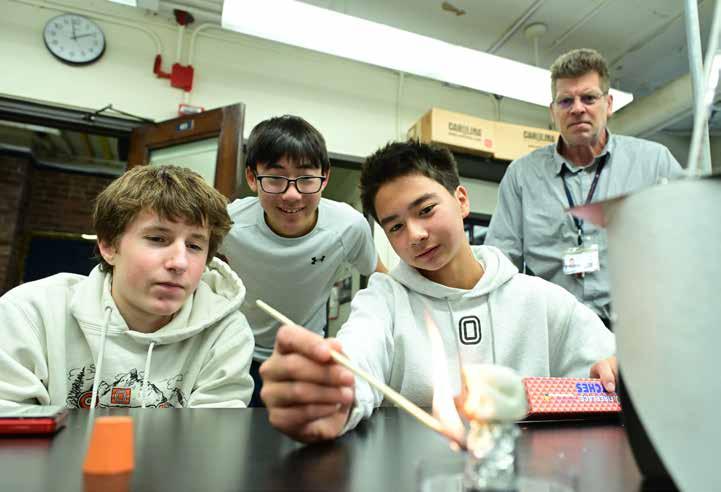
application of innovative technology to the use of statistical analysis.
In science classes, ECFS students are learning more than how to correctly identify the parts of a cell or the formula for velocity — they’re learning collaboration, problem-solving, and leadership skills that will aid them in becoming expansive innovators.
FSRP student Liam K. ’26 knows that scientific research isn’t just about the experiments, saying, “Lab work demands constant innovation to solve the problems that arise. Learning how to work effectively as a team to overcome these obstacles has been invaluable.”
“Science touches every aspect of our lives and society,” says Church. “The ability to analyze and apply data is essential for participating as an active, informed citizen in today’s world. Many of the solutions to our biggest challenges hinge upon a robust and thoughtful application of science.”
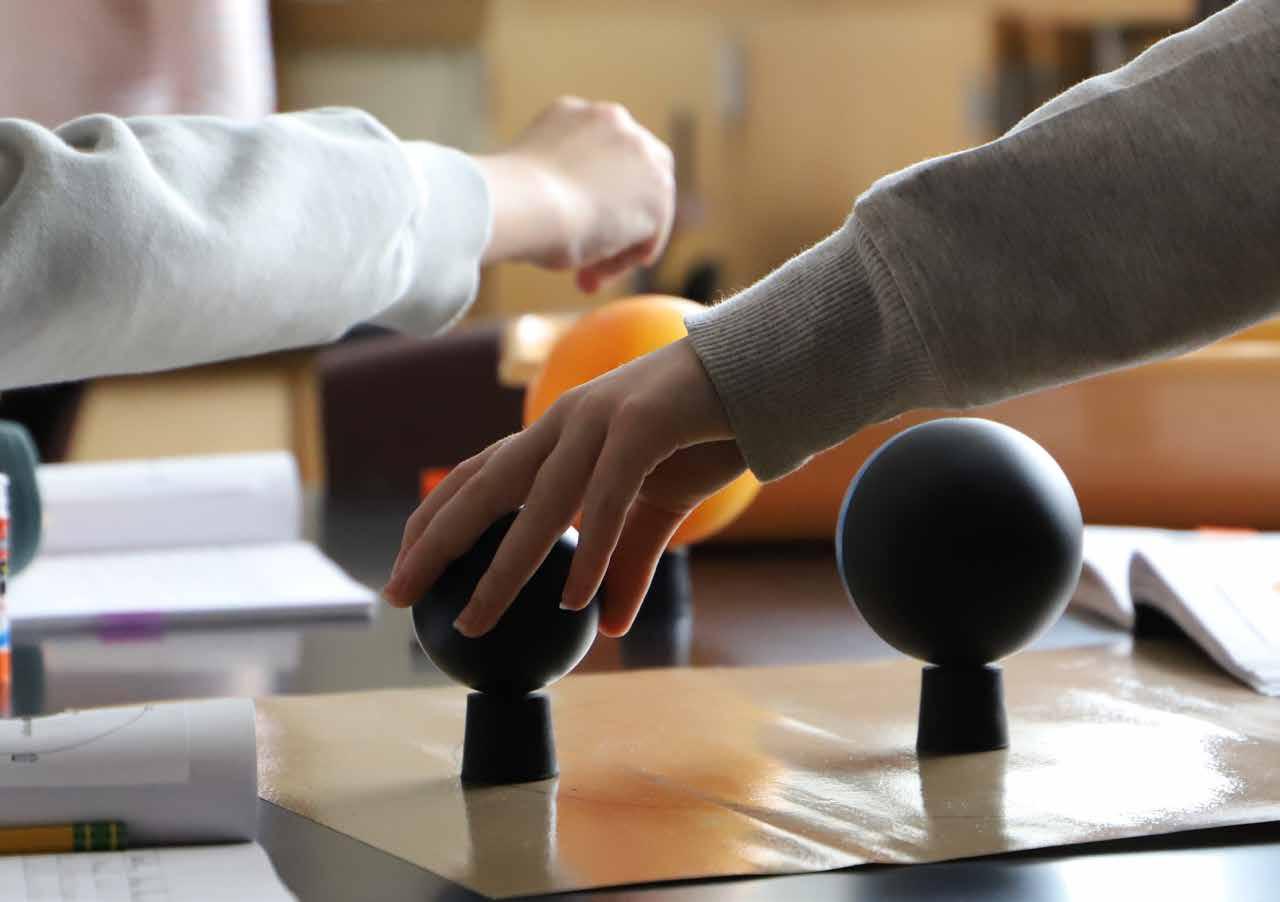

Our youngest students learn about the possibilities of technology and how this shapes their identity as global citizens. Developing technological literacy and curiosity is a cornerstone of an ECFS education, especially as students discover new ways to use technology ethically and incorporate it into both their daily lives and experiential learning projects.
Projects like Fieldston Lower 4th Grade’s “Ice Quest” unit challenge students to innovate with, rather than simply use, technology. Through hands-on experimentation, students are tasked with solving a real-world problem, albeit one that might seem alien to the average person: building a rover to collect data from the lunar surface.
The project, a collaboration between Fieldston Lower Math and Science Teacher Michael Wilkinson and Ethics and Technology Lead Kim Deveaux, is modeled on research conducted by NASA’s Jet Propulsion Laboratory (JPL), including an ongoing lunar rover mission. Creating a connection to the technology used by NASA scientists engages students in the stakes of
their work, Wilkinson explains, commenting, “Immersive projects give context to the skills and content in which students are engaged and learning. This transforms technology into a tool, a means to an end, a way to solve a problem, rather than being the end point.”
Using the LEGO Education SPIKE toolkit, 4th Graders build and program a rover designed to collect data from a mock lunar surface set up on the floor of the Adler Lab. However, this is far from their first exposure to coding and integrating math, science, and engineering with technology. “Every year, starting in Kindergarten, there’s the Week of Code, which is a Math and Technology collaboration,” explains Deveaux. “This is a culminating project that 4th Grade students do after learning about coding concepts and different coding platforms.” By the time 4th Graders begin building their rovers, they’re adept at learning a new coding language — the kind of flexibility that is essential in becoming innovators with new technology.
Building the rovers is a joyful experience as students experiment with various sensors, configurations, and mission objectives. Initially, they learn simple code sequences that allow them to program lit-up images on the body of their rover. One lesson buzzed with excitement as students showed their peers the different
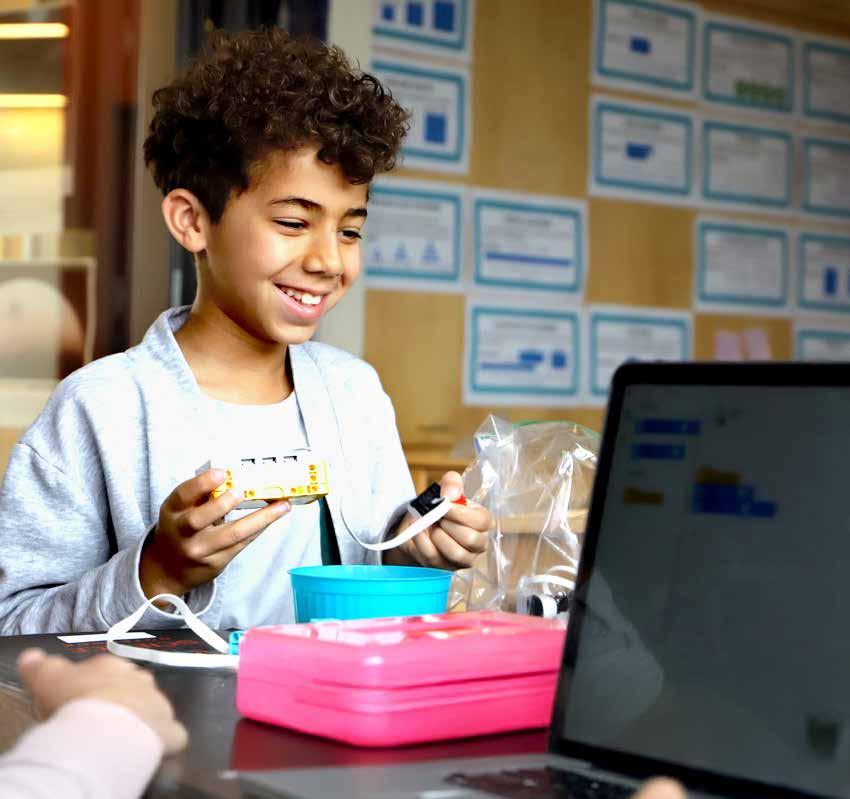
“Immersive projects give context to the skills and content in which students are engaged and learning.
symbols they created — everything from a smiley face to a heart to their own initials — and supported each other as they attempted increasingly complex shapes.
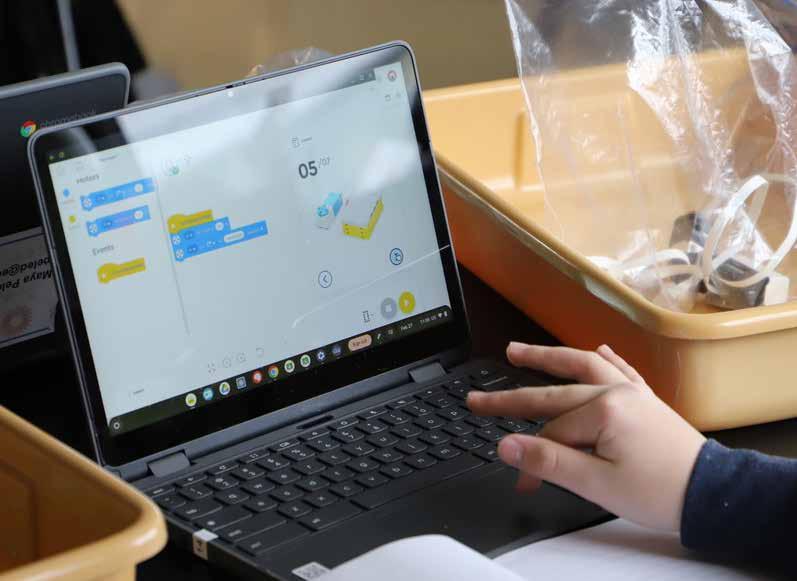
After learning the foundations of the LEGO SPIKE system, students dive into the real innovation: trialing different code sequences and rover builds. While technology is essential for a successful mission, Deveaux and Wilkinson intentionally integrate elements from other scientific disciplines, sharing, “In this project, students use previous experiences and knowledge of the moon to help them to design their rover — the technological solution — and also to shape their plan for how and where to search for the data they are seeking.”
As with any new technology, there is a period of trial and error. Rather than letting students feel discouraged, Wilkinson encourages them to take big swings, repeating the refrain that this experimentation is the process every scientist undertakes when conducting innovative research.
In 2024, students had the unique opportunity to speak with the NASA JPL scientists whose work on lunar rovers parallels their own. After flying their “missions” in the classroom, students hopped on a video call to compare notes with engineers, programmers, and research scientists who were waiting for mission clearance. Wilkinson was excited about the potential for reciprocal learning, remarking, “Our engineers
had flown their missions, so by talking to their engineers who’ve gone through all the design build and testing and are waiting for their ride to the moon, each team was really able to appreciate what the other was doing.” Fieldston Lower students gained experience that enabled them to empathize with the unique challenges these scientists face, from budget and weight constraints to navigating complex code.
“It wasn’t just talking heads at the kids,” reflects Wilkinson, “It was really a colloquium, which is exactly what we had hoped to achieve.” As students conduct increasingly complex scientific research in higher grades, they’ll continue that conversation, drawing on a foundation of research, experimentation, and curiosity as they expand their STEM skills.
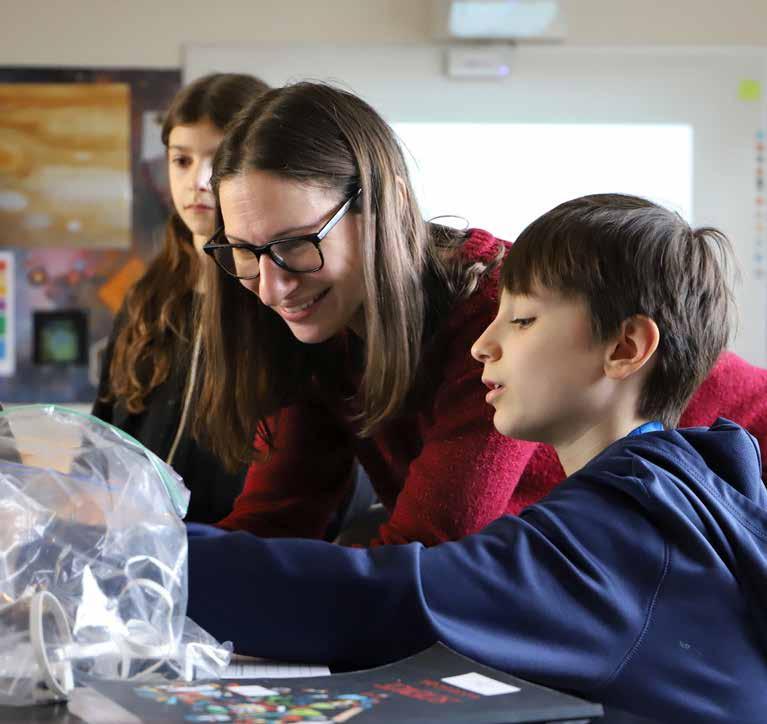
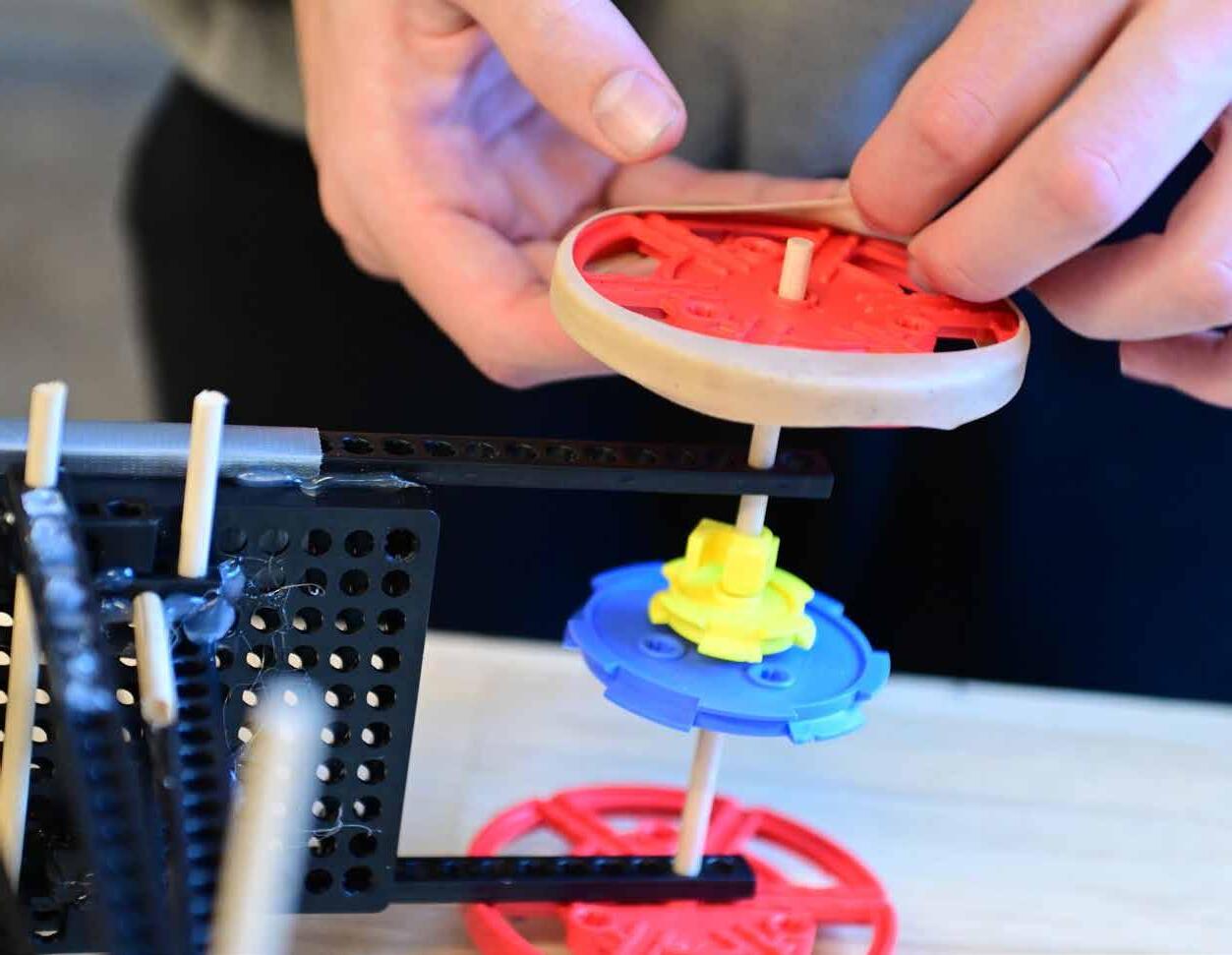
After their foundational introduction to technological innovation at the lower schools, students enter Fieldston Middle with the option to pursue engineering, joining a program that celebrates its 10th anniversary this year. First explored in 6th Grade’s team-taught science course that integrates intentional, multifaceted insights into ethics, engineering classes focus on implementing design features for adapting to climate change effects and constructing climate-friendly houses.
In 7th Grade, students who continue with engineering learn how to think like an engineer. They begin by exploring basic materials like cardboard and sticks with simple tools before gradually progressing to applying more sophisticated
techniques as they experiment with robotics and carpentry projects. “I’m happy when 7th Graders come away thinking, ‘What is a prototype? How do you iterate? How do you work with others as a team?’” says Engineering Teacher John Baglio, noting that as students familiarize themselves with these methods, “this room starts to feel like their room.”
Student testimonials underscore the program’s impact. Maddie R. ’29 explains, “I was inspired to take engineering because of my love of science and math. I was surprised by how much freedom we had to discover more about subjects like coding, art, and architecture.”
Reflecting on her final 7th Grade project, Sahaana M. ’29 recalls, “We
asked other teachers what we could do to help them, and it felt like I was truly helping someone make an impact on the world. Engineering is about finding solutions to different realworld problems, which can make a difference in someone’s life.”
The key 8th Grade project involves building a cardboard chair, which requires prototyping and scaling processes before physical construction begins. This aligns with the 8th Grade engineering goal of enhancing existing skills and attention to detail.
Maddie noted the project’s impact on her engineering process, saying, “This project taught me the importance of detailed planning with steps such as sketching a design, building a
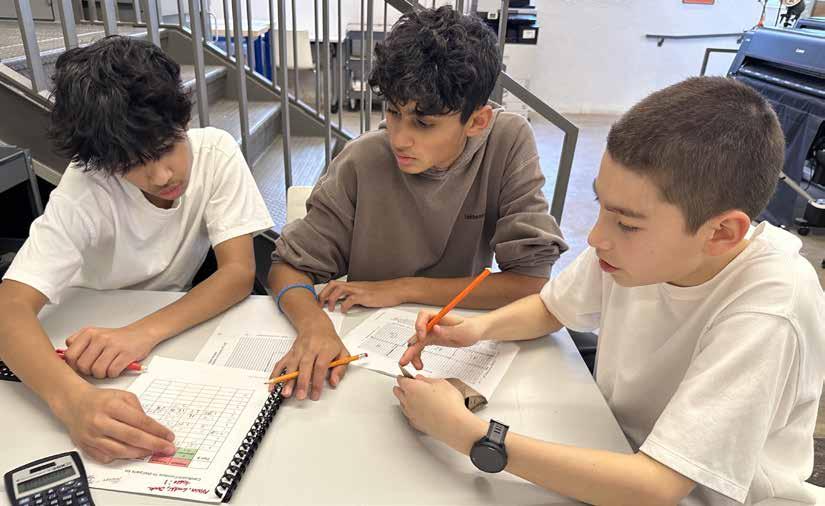
prototype, and then planning how we will use our allotted amount of materials.”
“It’s a class environment that’s unlike others,” Baglio explains. “Engineering has a reciprocal relationship with science, and when students are in engineering, they see the practical applications of things they’ve learned about in science.”
“Engineering is a space where we’re allowed to be creative without being stressed,” adds Shehrzad K. ’29. “We are also able to learn better problemsolving skills, which is helpful in other classes.”
Fieldston Middle Principal Jon Alschuler has seen the impact of the engineering program firsthand. “We now have students giving up their study hall time to take the elective offering and recess time to participate in engineering clubs. Engineering exposure helps students consolidate their knowledge in a very powerful way.”
Thanks to the program’s longevity, Baglio has seen many students continue engineering at Fieldston Upper, with some joining advanced initiatives like the national awardwinning Rube Goldberg club and robotics teams to further cultivate their interests. This year, Kai KS. ’25, Nate S. ’25, and Daniel B. ’25 served
ourselves as individual learners,” they say. “The first and often most important thing to remember is the engineering design process: brainstorm, design, build, break, redesign. This process is just as important to everything else as a learner.”
All three seniors plan to pursue engineering fields in college, and their Fieldston Middle peers are already
“Engineering has a reciprocal relationship with science, and when students are in engineering, they see the practical applications of things they’ve learned about in science.
as teaching assistants (TAs) for a Fieldston Upper robotics class, a culmination of their ECFS engineering experience.
“Our engineering journey began at Ethical Culture in engineering class,” the group of seniors share. “We learned about Mindstorms LEGO robots and fell in love with the engineering process. The potential of what could be built hooked us immediately.” After continuing their learning in Fieldston Middle classes with Baglio, the students were inspired to start a FIRST Tech Challenge robotics team in 8th Grade. As their engineering skills grew, so did their success — the team has accrued upward of 30 regional awards!
Eager to give back, the students approached Baglio looking for new opportunities during their senior year. In addition to creating a second robotics team of 20 9th Graders, they began as TAs for 17 students in the Advanced Robotics and Fabrication course, developing course materials for computeraided design, micro:bit robotics, and the design process.
“Engineering has taught us so much about
considering how engineering can support their future careers. Samir G. ’29 shares, “Engineering is helpful if I pursue a career in civil, biomedical, or computer engineering or work on innovative projects benefiting society, such as clean and efficient transportation systems or agricultural and water irrigation projects that could potentially solve world hunger.”
“I talk about engineering as working toward a concept of agency,” Baglio says. “‘You can do it; you can figure this out.’ I hope that this carries over into students feeling more empowered in their lives outside school, whether it’s confronting climate issues or politics or using these problem-solving skills to make them feel more capable in an uncertain world.”
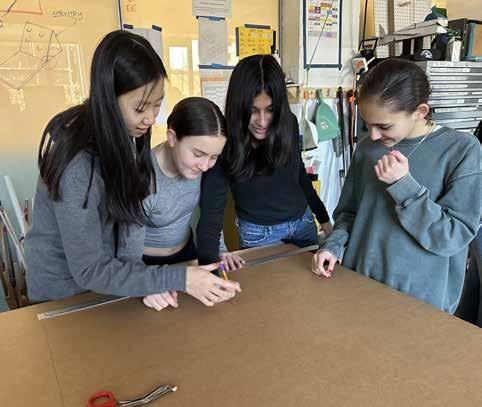

Underneath every rover built, every chair engineered, and every lab experiment is a strong foundation of mathematical reasoning.
Whether they’re swinging on the monkey bars or writing a paragraph, students engage in learning as an active, creative process — one that is playful, sparks inquiry, invites discourse, and empowers them to progress with independence. With this ethos in mind, ECFS students view math not as a set of formulas to memorize but as an integral part of everyday life.
This year, Ethical Culture Math Specialists Jen Cooley, Becky Weintraub, Nina Liu, and Larry McMillan have put their students
through their paces in ways that serve to build understanding and conceptualization, not mere mindless practices.
From Kindergarten through 5th Grade, students embark on a journey that illuminates the links between abstract mathematical theories and real-world applications. It begins with simple ideas, such as shapes and numbers, and gradually builds logical reasoning through pattern activities. During morning meetings, partner games, and guided explorations, math is seamlessly integrated into each day’s activities, making mathematical thinking second nature.
One recent example is a project that Weintraub created for her 1st Grade
students. Each week, Weintraub’s 1st Graders have scheduled “choice time.” This time is built in to allow students to engage more deeply with an interest, whether that be art, reading, writing, or, you guessed it, math!
This winter, during weekly choice time, students were introduced to BeeBots — small programmable robots — and tasked with programming them to move certain distances across the classroom floor. Estimating the distance the bots traveled along a taped path or the length of a book also got students actively thinking mathematically about units of measurement, estimation, and spatial reasoning.
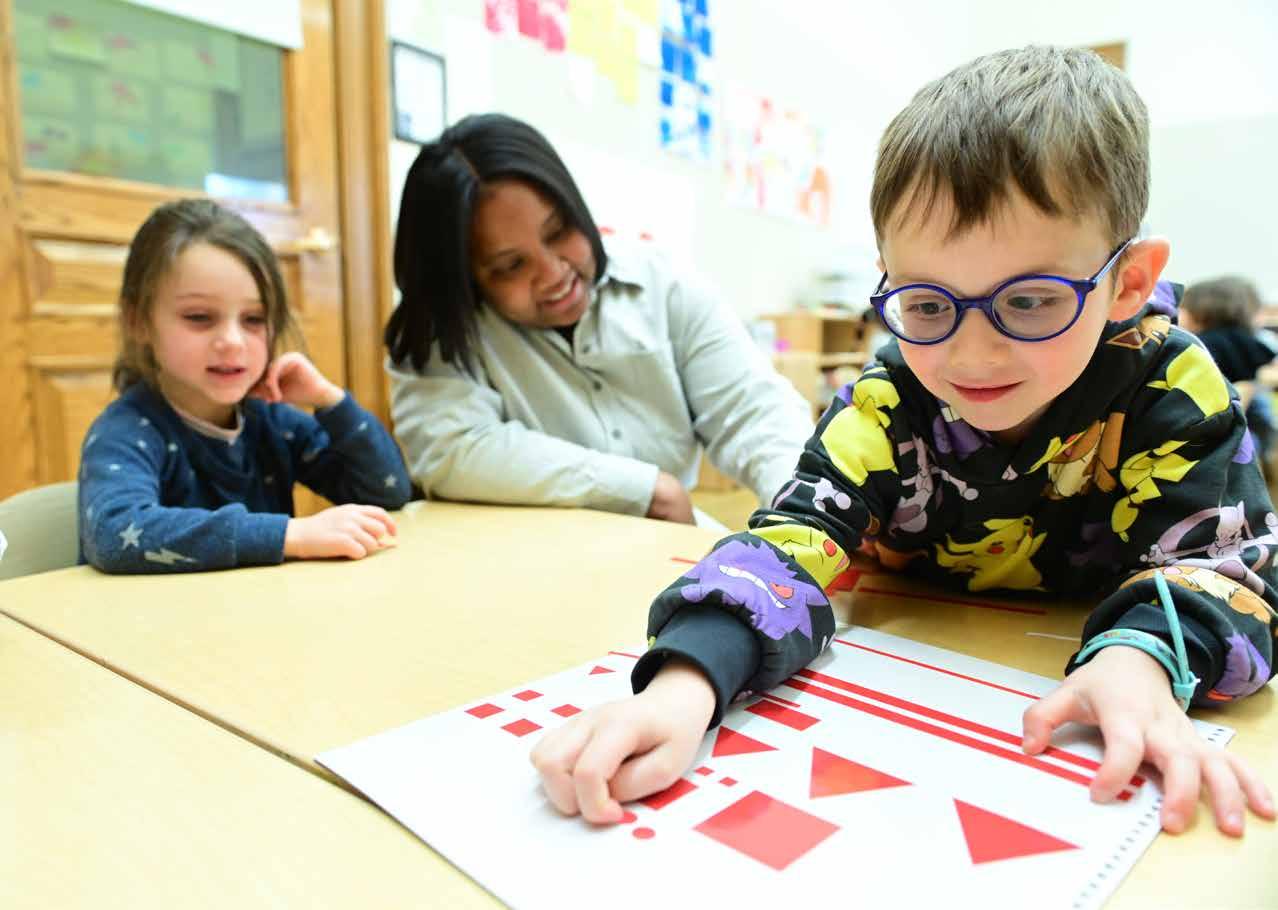
“One defining feature of our approach: an understanding that learning is more effective when it is collaborative, joyful, and based on shared responsibility.
Every step of the way, Weintraub asked students to explain the reasoning behind their predictions or their programming decisions, encouraging them to improve their math literacy. “From an early age, we deemphasize speed and instead try to develop fluency. Math is not an Olympic sport. Instead, we tell students, ‘Your thinking and work matter and deserve recognition. Doing your best means embracing challenges and recognizing the value in where you get stuck,’” shares Weintraub.
This methodology continues as students advance through each grade, beginning to explore multiplication, division, factors, multiples, and the properties of numbers. Real-world connections are the heart of the math curriculum, as students generalize mathematical concepts and apply them to interpret data, identify solutions to complex problems, and make informed decisions. Students are consistently encouraged to think critically and creatively, whether the challenge involves creating tables and graphs in Social Studies Workshop or engaging
with exponential growth and division strategies.
Once students reach 3rd Grade, they can opt to join the Math Club, which provides a space for students with a particular interest in problem-solving to engage with extended challenges that extend beyond the classroom curriculum.
“Our older students have the skills and background knowledge to engage with a wider range of topics in mathematics than we can fit into math class,” says McMillan. “It is a lovely puzzle to determine if a particular group of students is better suited to investigate ciphers or applications of symmetry in nature.”
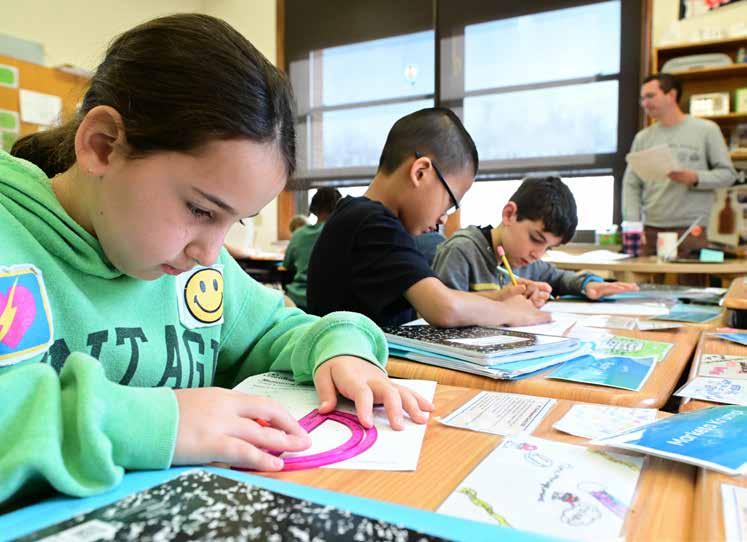
Recently, 5th Graders in the Math Club faced a geometrical challenge: building origami structures from Sonobe modules. These modular units enabled students to construct complex polyhedrons, including cubes and stellated octahedrons. While folding and assembling their designs, students practiced spatial reasoning and geometric principles, such as calculating the number of modules needed for each shape and considering relationships between different geometric forms. The 5th Graders brought this learning to the next level when they taught these
concepts to 2nd Graders, further cementing their leadership within the school community.
These moments of stewardship, when older students step up as mentors and collaborators, are intentionally woven throughout the ECFS curriculum and offer a powerful reminder of one defining feature of our approach: an understanding that learning is more effective when it is collaborative, joyful, and based on shared responsibility.
“Learning by doing is a precept at ECFS, and the 5th Graders consistently show their commitment to such work,” shares McMillian. “But if you asked them, they would tell you it was for fun.”
This interdisciplinary approach allows students to interact with math in surprising ways. Through real-world inquiry, collaborative learning challenges, and a supportive environment, our teachers cultivate confident problem solvers who are comfortable with complexity, lead with curiosity, and take mathematical thinking with them far beyond the classroom walls.
At ECFS, students learn to solve real-world challenges through what they study and how they engage with it. Throughout their time at our School, students experience a joyful, inquiry-based approach to math, early exposure to ethical and cutting-edge technology, experiential engineering lessons, and rigorous science and research offerings. STEM education across each division cultivates resilience, independence, and innovation, preparing students not only to excel in college but also to step into the future with vision,

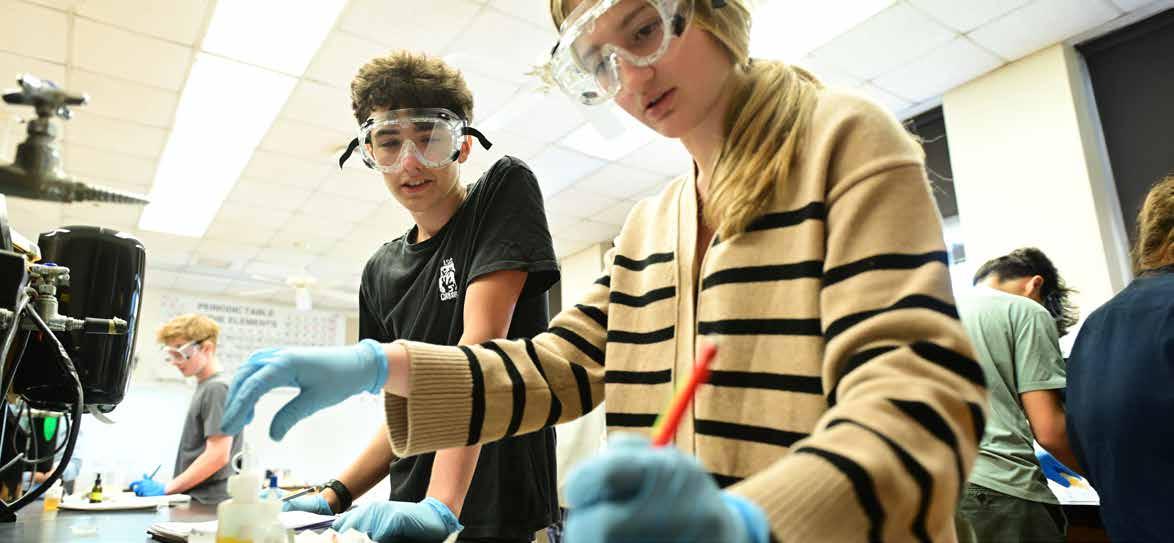


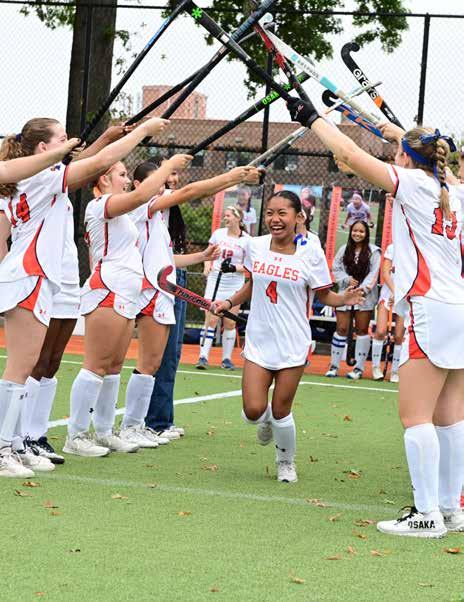
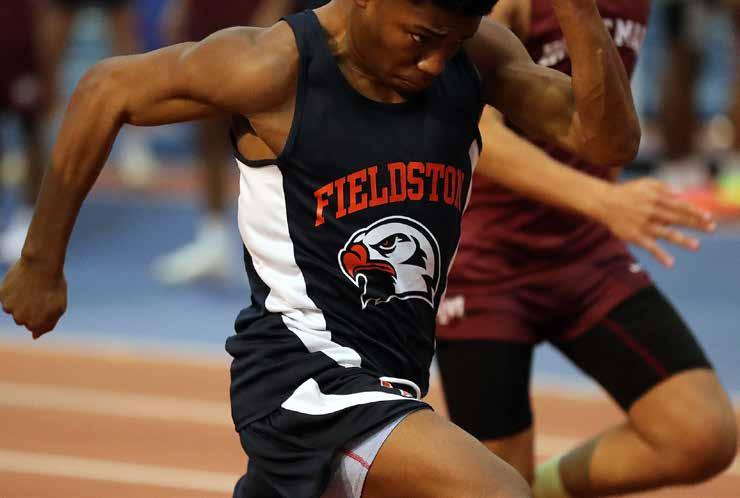
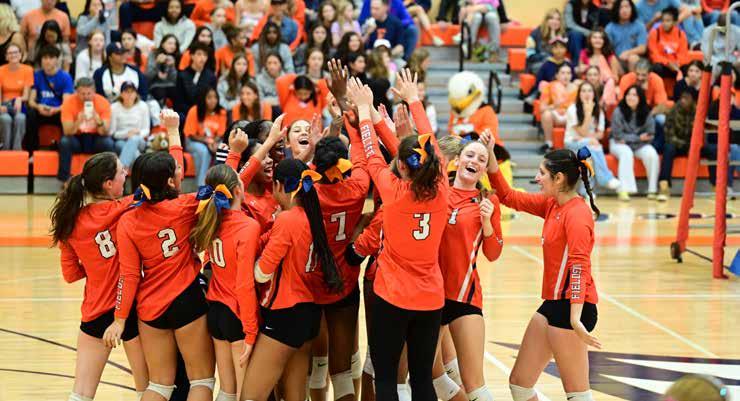
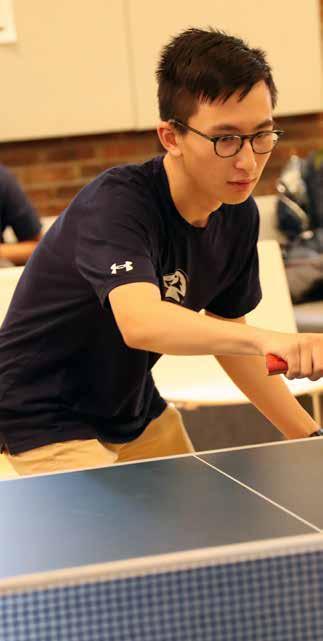


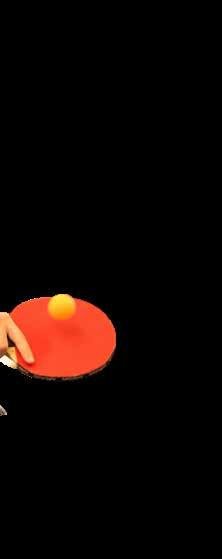
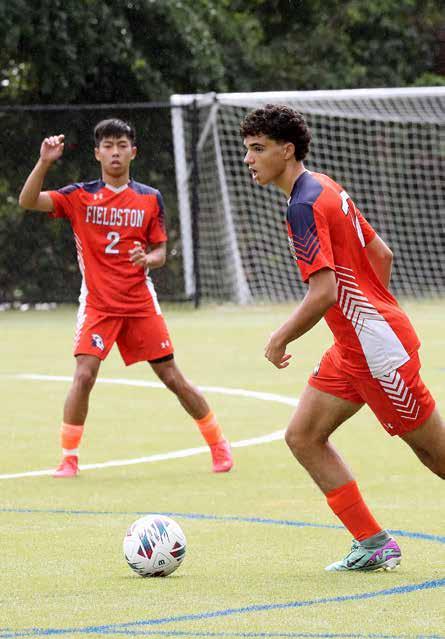
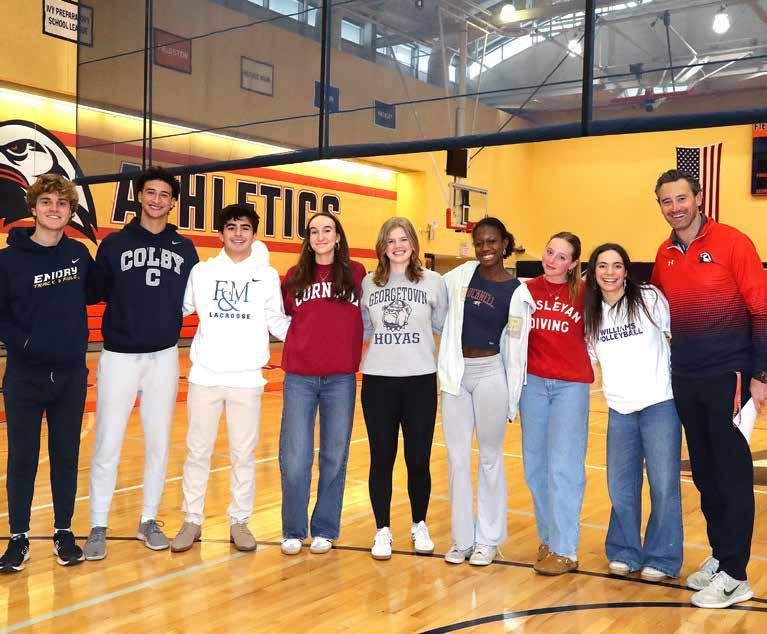
At Fieldston Upper, athletics means more than early morning practices, team dinners, and winning championships. Student athletes at Fieldston learn essential skills — leadership, camaraderie, resilience — and strengthen their commitment to our core values through their time on the field, court, track, or in the pool.
Juliette R. ’25 plans to run track at Bucknell next year. She’s excited about her athletic future but plans to stay connected to the ECFS community. “I knew that I’d always have my home on the track team to return to,” she reflects. “Even after I graduate, I can come and still feel part of the team.”
This year, eight Fieldston seniors are committed to playing a diverse variety of sports, from lacrosse to squash, as college athletes.
Lily S. ’25 began playing field hockey in 9th Grade. In the fall, she’ll begin her college career at Georgetown after leading her team to Fieldston’s first-ever NYSAIS field hockey championship, a dream she achieved with the “unconditional support” of coaches and Athletics Director Gus Ornstein ’94. “I’ve spent hours on the Upper Field and in the gym; without Fieldston, I wouldn’t have had the support and confidence to fulfill my dream.”
With over 20 teams, the Fieldston Athletics program is poised to continue growing. Students have introduced new sports, like boys volleyball, and achieved historic victories and championships. More than anything, student athletes have remained committed to playing well and ethically — a true ECFS win.
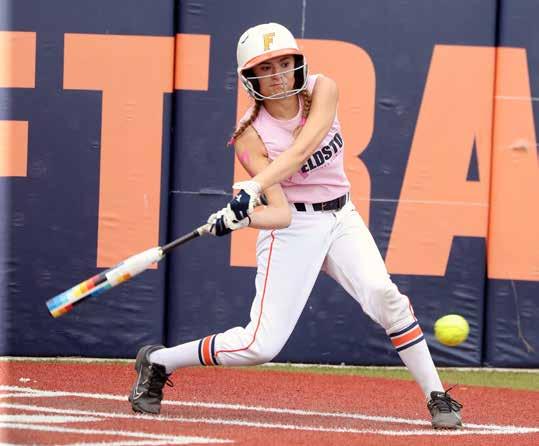



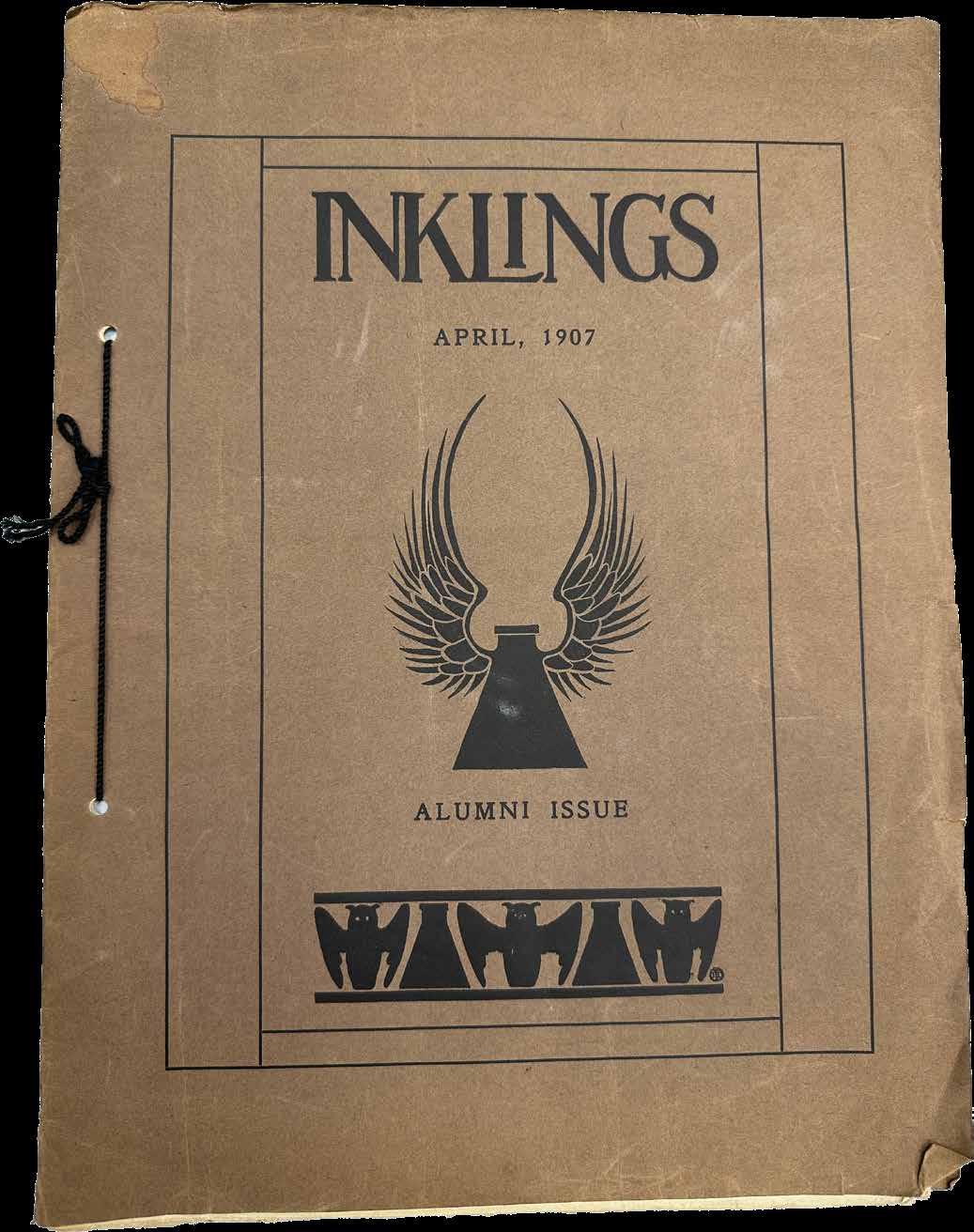
Dating back to 1902, the Fieldston Upper academic journal “Inklings” has captured the evolving voices of students across generations. Initially a showcase for students’ original works of fiction and poetry, the journal was revived in 2016 after English Department faculty rediscovered earlier editions and recognized its editorial potential to showcase work beyond English and teach students how to run a journal. Today, “Inklings” features work from all subjects selected from anonymous student submissions of class assignments. Submissions are reviewed by a peerled editorial board that curates a final collection. This student-driven
process supports Fieldston Upper writers in developing their own editorial taste.
“We emphasize that the editors’ tastes and selections matter,” says English Teacher and “Inklings” co-adviser Gina Apostol. “As an adviser, I make a huge effort not to include my own opinion during the actual editorial meetings. We listen. Students choose.”
What begins in “Inklings” as academic insights becomes a historical record, capturing the year’s most prevalent global and social issues through the voices of ECFS students. Readers of
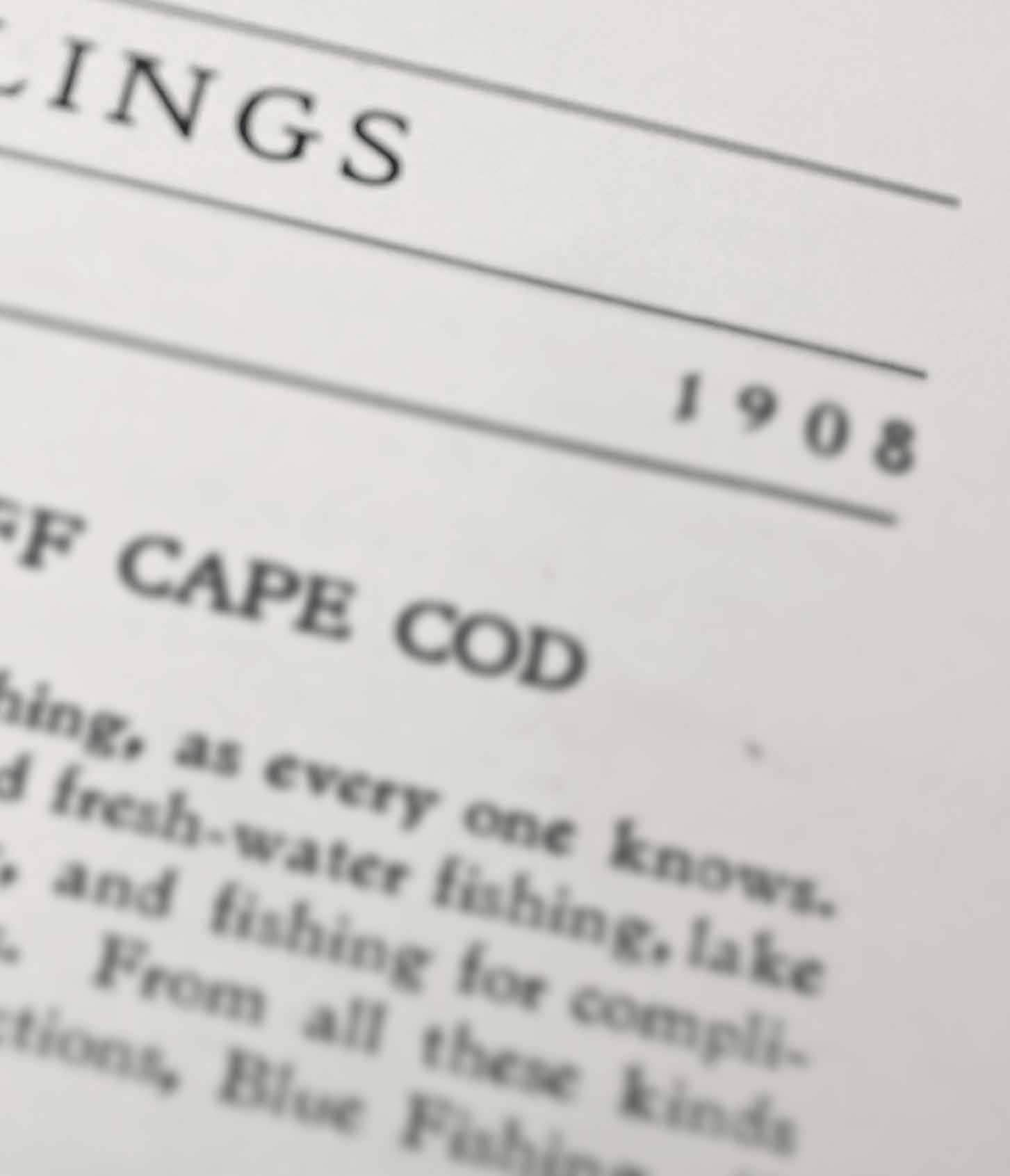
past editions will find notable alumni as student contributors, including jazz musician and poet Gil Scott-Heron ’67, Edgar Award-winning mystery writer S.J. Rozan ’67, and Alexander Hamilton Professor of American Studies at Columbia University Andrew Delbanco ’69.
This opportunity to recognize interdisciplinary efforts and appreciate each other’s work allows Fieldston Upper students to find fulfillment in capturing their personal interpretations during a pivotal stage of life.
By Saskia S. ’26
Our splintered wood chairs feel especially vicious today, and pernicious strings poke from the floral cushions your mother gifted us in better timeswhen the slow stir of the coffee machine felt akin to that one Beatles song you would sway me to.
We could never quite remember its name, but I suppose details like labels are unimportant to the loving mind. Now, we call life what it is. A mundane tango around the thumping vessels within us, sporadic indulgences into the thoughts pervading our cerebrals as we sit in the silence characteristic of our earliest hours together.
I ask for the milk, and he obliges.
As liquid cascades into a vat of Cheerios, (the safe and only choice, for we never really make it to the market these days) I watch the Os dampen into their weakest form And accept them as they are.
Sat in his world, I appear a murky reflection of The self I once knew.
Lifting silver to my tongue, I glance over at our life, spread across a gingham platter. Newspaper outstretched, toast a bit too burnt for my liking, And no refuge in the grape jam that reminds me life can be sweet.
We will do it all again tomorrow, Serving not ourselves but the stranger across the kitchen.


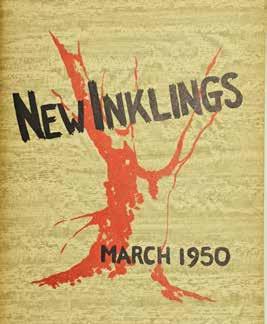
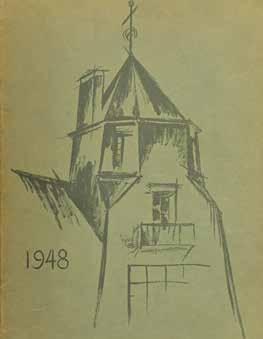
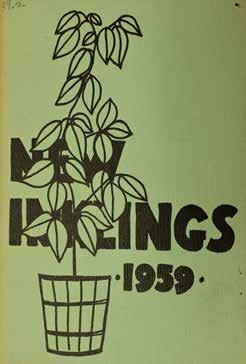
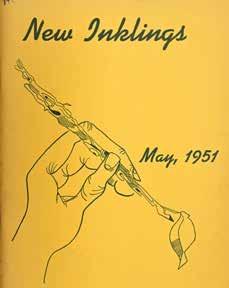
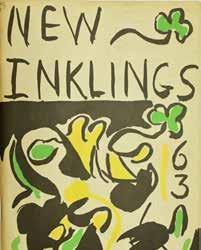

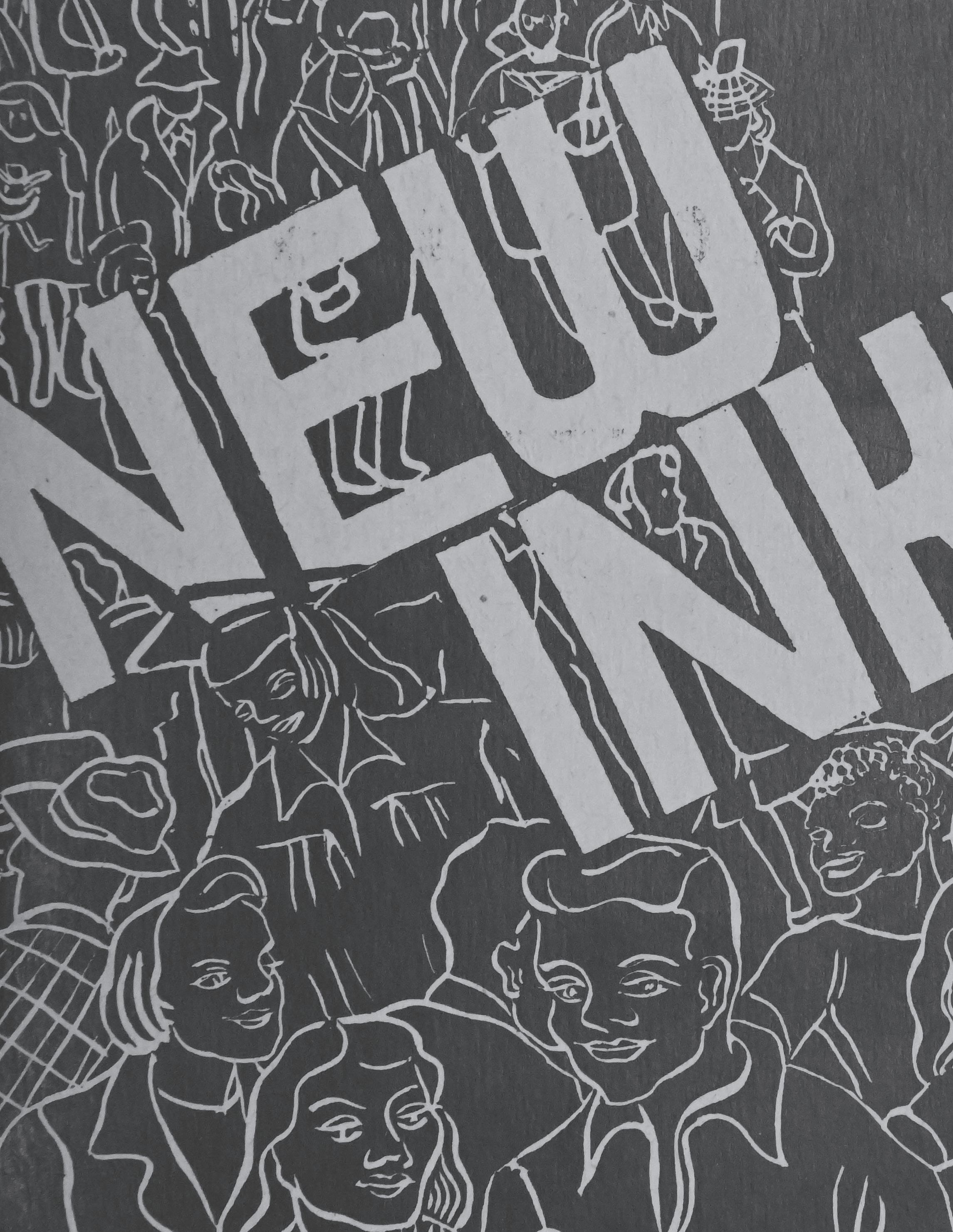
By Caitlin N. ’25
Because Asian food has migrated so widely across the world to so many different places, our recipes vary from family to family. Each variation tells a story of our family’s cultural and immigration history, who we are, and where we’ve been. This assignment has caused me to wonder why I was never told about Fried Rice’s deep history and revision over time; why did it take a school project about food migration and a considerable amount of my own research for me to learn about one of my own culture’s staple dishes? As it turns out, my Tutu was well aware of the root cause of Fried Rice: a dish that acted as a partial solution to economic hardship that was affecting much of China’s population at the time. So, why was I never educated about the origins of one of my favorite homecooked meals?
I first turned selfishly to my Mom and Tutu, questioning whether they were to blame for my lack of knowledge, quite honestly, for a large portion of my Chinese culture. I quickly became frustrated with myself for ever thinking that either of them wouldn’t warmly welcome any conversation concerning my Chinese heritage whenever I brought it up. At this point, I arrived at the embarrassing conclusion that I was largely at fault for my cultural blindness of sorts. My Mom, my Tutu, and all of my relatives for that matter, would always invite my questions about our ancestors and their traditions with open arms; the issue was that I rarely allotted time for such identity-based explorations. It was surprising to me that something I considered to be

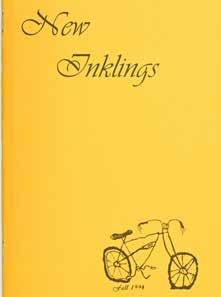
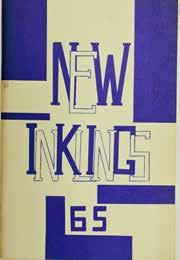
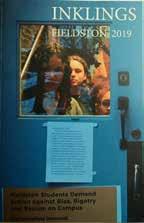
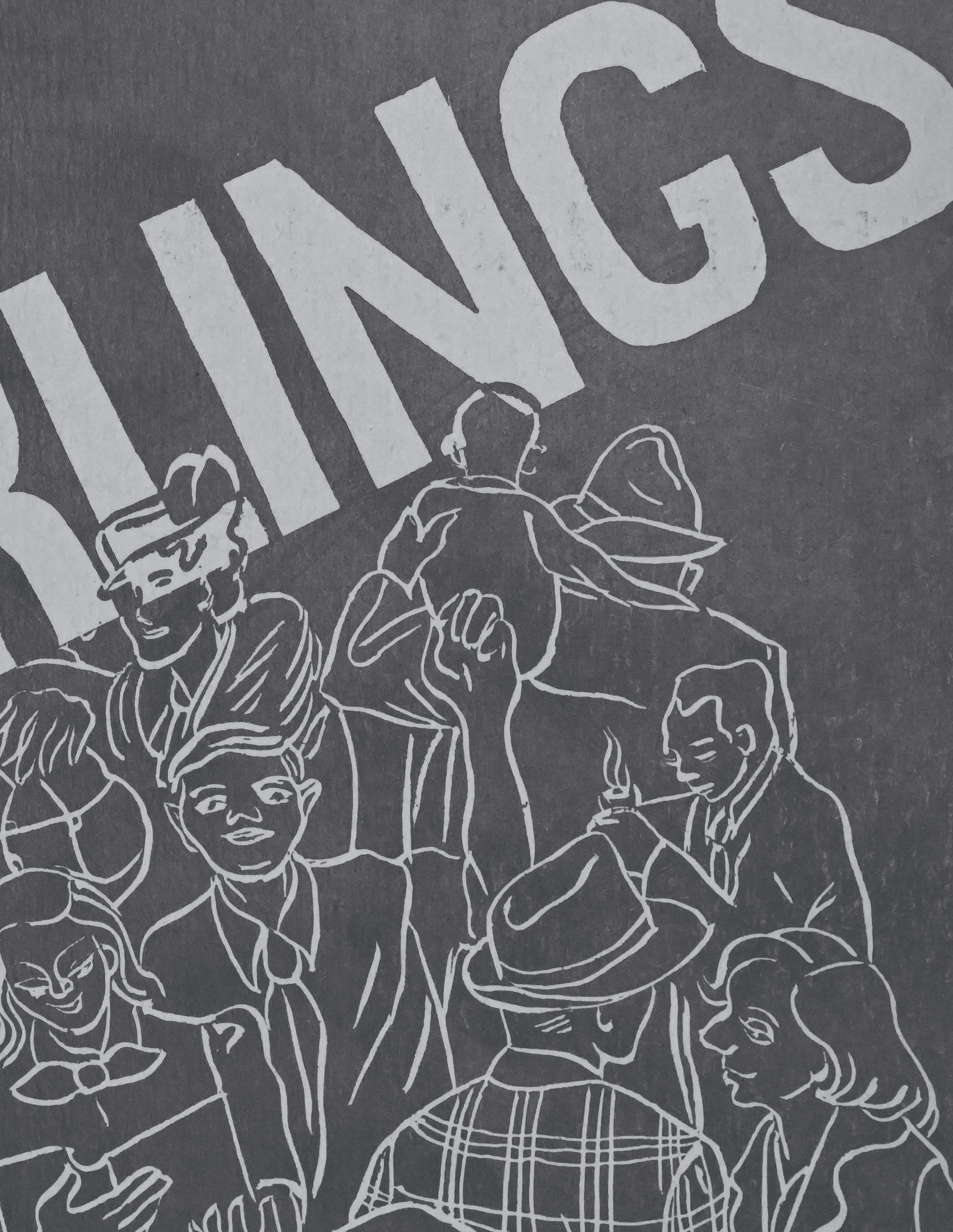
so simple and mindless my whole life like Fried Rice really had such meaning and cultural significance.
The dish acts as a placeholder for rich culture and traditions because it acts like a personal map for my family. It’s no secret that there are countless variations of Fried Rice; this is in part because of the spin that each household puts on the general recipe. Moreover, individual families will have different definitions, criteria, and ingredients for their Fried Rice because of their family history. My family’s Spam Fried Rice includes a local Hawaiian canned meat, Spam. What is not seen from the surface, however, is the significance of the Spam, what history it holds, and what it says about our family’s immigration story. When I was younger, I didn’t know that Spam wasn’t a (somewhat) commonly eaten canned good for most of my classmates here in New York. As I learned when I became older, Spam is most commonly eaten in Hawai’i because of its wide popularity since the demand for such easy meat increased during Pearl Harbor’s time in WWII. Today, the versatility of Spam still lingers in most local Hawaiian dishes called plate lunches. Evidently, it’s no surprise that most Chinese who immigrated to Hawai’i, like my family, started to incorporate Spam into their Fried Rice when they arrived on the islands. So, I guess you could say that the variation and specific recipe of my Tutu’s Fried Rice acts as a distinctive depiction of her family’s generational immigration from China to Hawai’i.
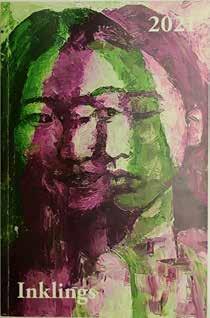

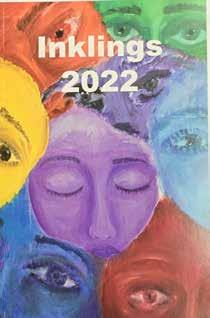


Ethics does not end within a classroom’s four walls. At ECFS, we believe that all of our spaces, from dining halls to corridors, must reflect this ethos. To uphold these values, we prioritize creating an environment that fosters social-emotional learning and encourages meaningful interactions among students and employees. This means designing spaces that not only are aesthetically beautiful and able to manage our School’s capacities but also center the importance of sustainability and experiential learning.
Over the past several years, both the Fieldston and Ethical Culture campuses have undergone significant facility upgrades, all designed to support our mission of a sustainable, ethics-centered, and forward-thinking learning environment. This is all made possible thanks to the unbelievably generous philanthropic support of our community and the dedication and expertise of our Operations team. We look forward to making additional improvements and building on this foundational capital work in the years ahead.
Ethical Culture’s fifth-floor renovation project was completed, transforming the specials classrooms into dynamic, interdisciplinary, and flexible spaces.
Ethical Culture celebrated the installation of the basement floor’s air conditioning and the unveiling of a newly designed lower cafeteria. This improvement created a bright, welcoming space for ECFS’s youngest students and a versatile space for the after school program.
The Fieldston Lower building is now fully airconditioned. Even better, the building’s state-of-the-art HVAC system is designed to reduce fossil fuel use, making it a win for both comfort and sustainability.
The interior of the Fieldston Middle and Upper Dining Hall was redesigned to better manage traffic flow during lunch periods, enhance our programmatic offerings, and upgrade our front-of-house equipment.
When making improvements, we also consider beautifying our campuses. One such project included resurfacing the floors in the Varsity Gym and the Ethical Culture basement gym and modernizing Fieldston Lower’s first-floor hallway.


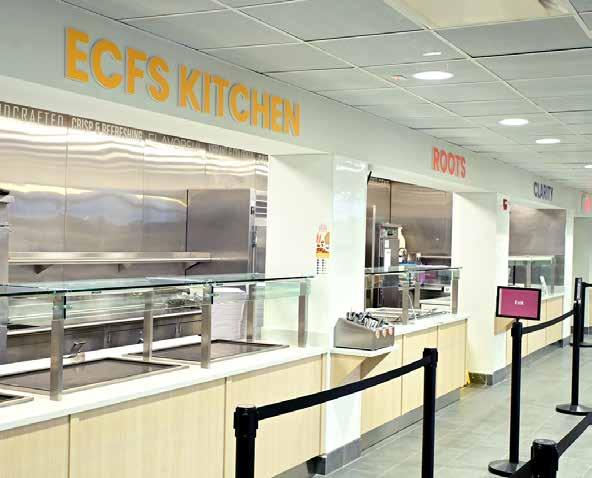
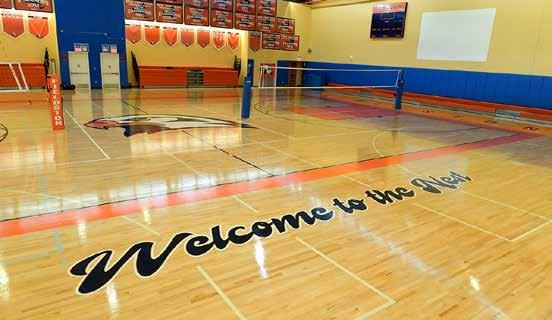
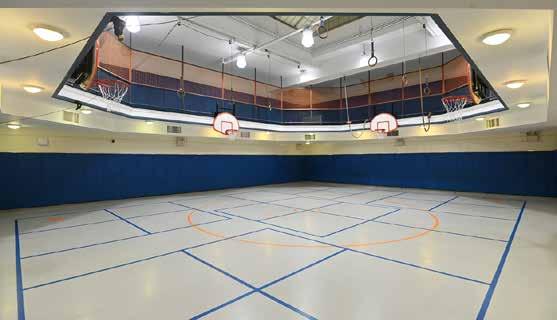
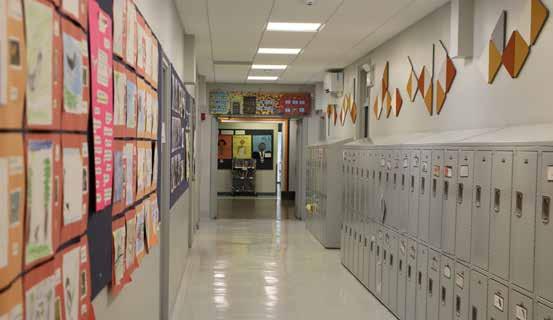
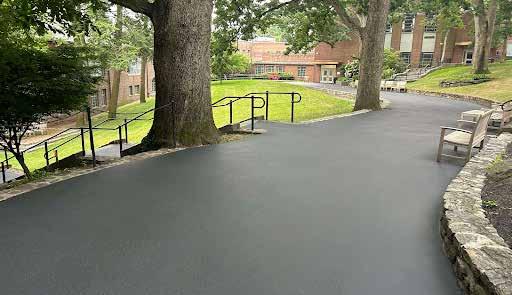
Summer
Ethical Culture’s multiyear renovation project will be completed this summer. This phase includes the installation of air conditioning in all remaining classrooms, reducing our reliance on boilers over time and fostering a comfortable environment for students, families, faculty, and staff!
We are proud to announce the renovation of the Fieldston Lower playground, made possible through the extraordinary generosity of a single donor. This remarkable gift will bring
to fruition a dynamic playground that will be transformed into a STEAM-based environment, seamlessly blending fun, learning, and nature. With a complete structural refresh, upgraded soft matting for safety, and brand-new sun sails for added shade, this space will encourage imaginative and collaborative play while incorporating interactive features, such as engineering challenges, science stations, and water tables, ensuring that playtime nurtures both body and mind.
Recognizing a need to expand our science and innovation spaces at Fieldston Upper, we spent the past year collaborating with architects and construction firms to survey our campus and consider possibilities. This bold initiative to construct a new state-of-the-art building to support our programming marks a significant step toward advancing our mission to provide students with unparalleled opportunities for rigorous, STEM-based learning.
We envision the new science and innovation building
becoming a dynamic hub for discovery, innovation, and collaboration, thereby dramatically advancing the scope and scale of student research. As ECFS prepares for the next 150 years of academic excellence, the potential for expansion and deeper exploration in science and innovation is inspiring and boundless.
For details of how you can participate in these exciting projects, please reach out to Rose Turshen at rturshen@ecfs.org
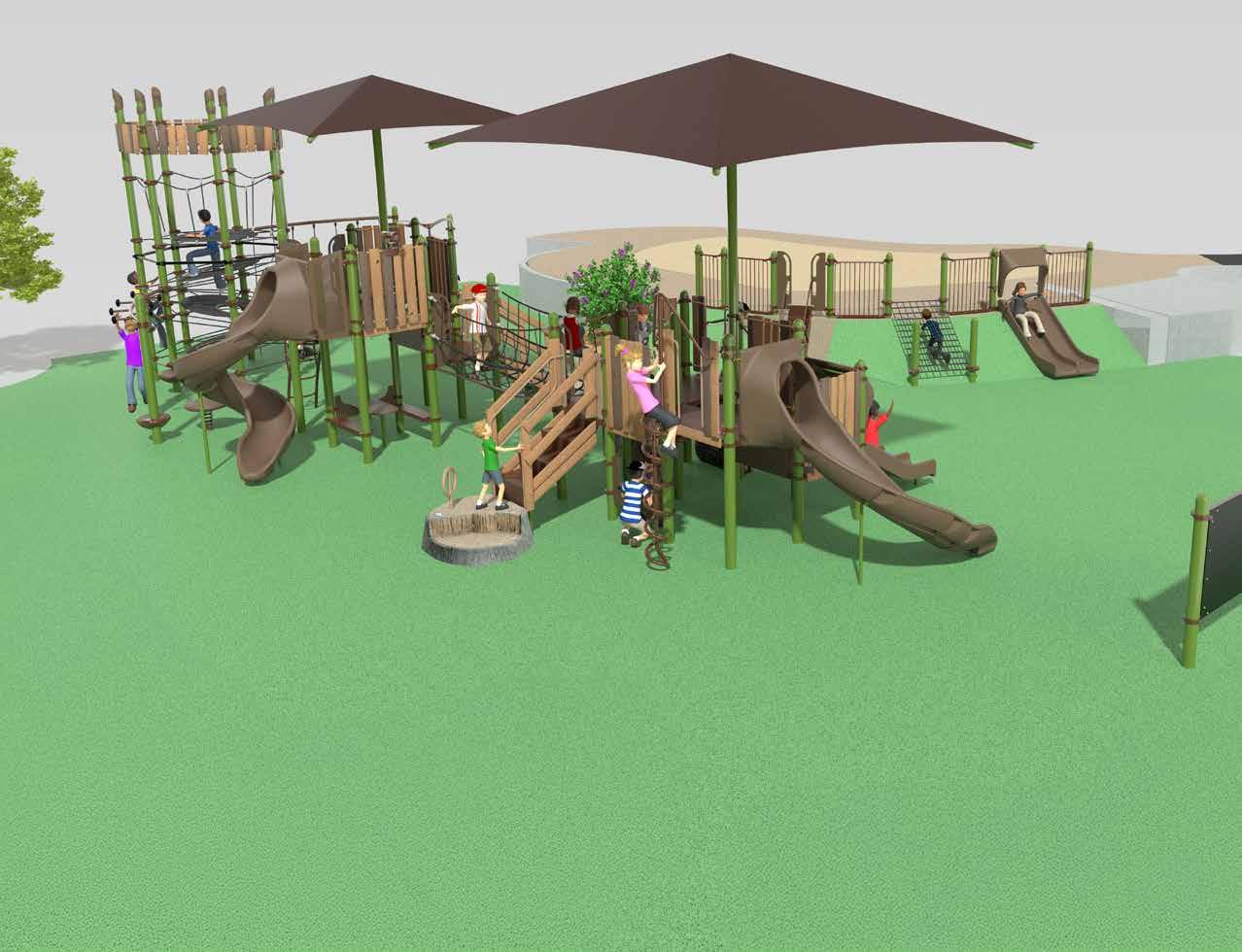
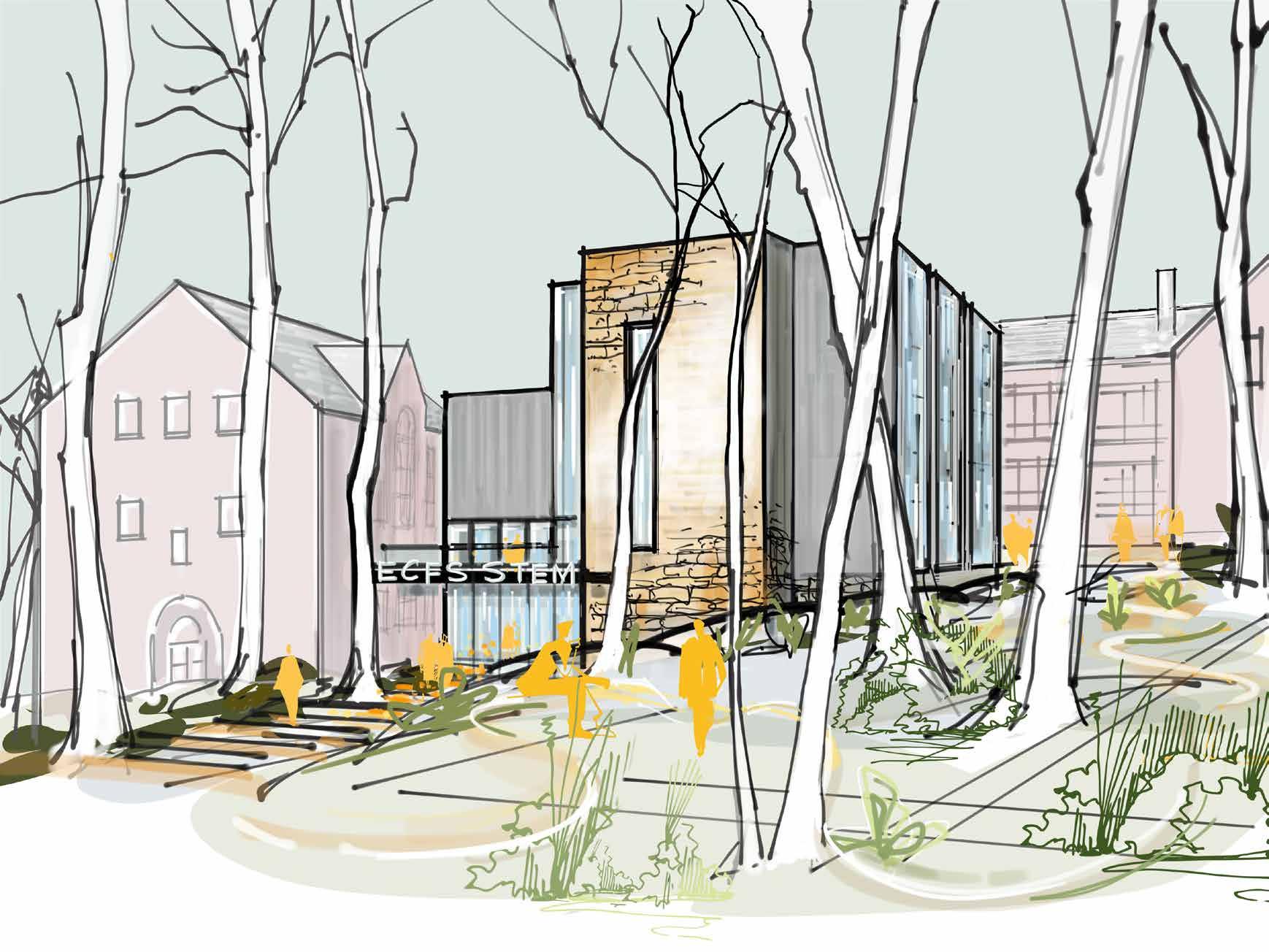

Whether launching student initiatives, sharpening their minds with a chess game in between classes, or developing critical thinking skills in a seminar, the Class of 2025 has made the most of their senior year at ECFS. We followed Fieldston Student Government (FSG) Co-Presidents
Ellis LK. ’25 and Clara T. ’25 on a typical day filled with classroom discussions, creative exploration, and developing leadership skills in sports, school, and beyond.


Clara: I love walking into Senior Seminar, a participation-based capstone English class for seniors. We’re encouraged to collaborate and think critically, complete analytical and creative assessments, and take turns leading rigorous and intellectual class discussions on a variety of texts, including “Invisible Man” by Ralph Ellison, “Labyrinths” by Jorge Luis Borges, and “Counternarratives” by John Keene. We’ve analyzed complex themes through a multitude of lenses, which inspired me to read full texts independently and debate interpretations with peers inside and outside class. Exploring concepts of infinity, learning about poststructuralism, and connecting historical contexts to modes of narration has challenged me in ways I didn’t expect to encounter until college.
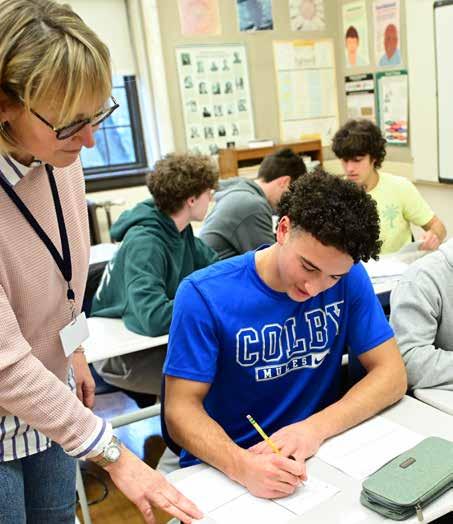
Ellis: My first period class is “Silence and Noise: The Politics of Storytelling,” taught by Dr. Brown. In this class, we’ve read “There’s Always This Year” by Hanif Abdurraqib, “dayliGht” by Roya Marsh, “Klara and the Sun” by Kazuo Ishiguro, and “Fun Home: A Family Tragicomic” by Alison Bechdel. Though these books are different genres, we analyze the importance of the stories that they tell. Dr. Brown has pushed me to grow as a reader and writer in a way I haven’t been before.
Another class I have loved having this year is calculus. Not only do I have friends in the class, but Ms. Hanson makes math very engaging, and I’ve enjoyed learning about the concepts and applications of calculus. Having Ms. Hanson as a teacher who encourages mistakes also makes math class a joy.
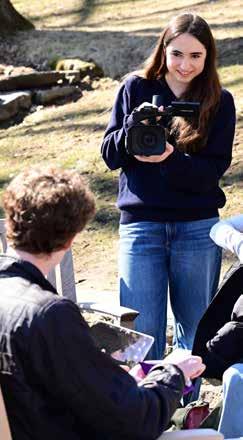
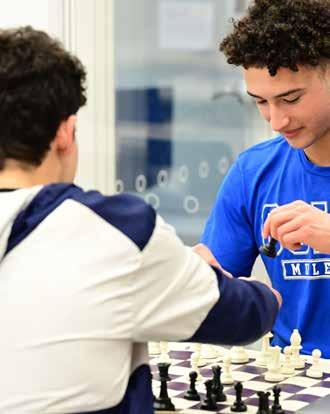

Clara: Every Wednesday during lunch, Ellis and I meet with Ms. Ruth Taveras, Dean of Student Engagement, to discuss our agenda and catch up on personal and academic updates. Occasionally, we host an FSG cabinet meeting or meet with Dr. Stacey Bobo, Mr. Kyle Wilkie-Glass, and other faculty about student initiatives.
I ran for FSG to represent students on important issues, gain leadership experience, and strengthen our community. It has allowed me to build relationships with students, faculty, and administration while learning how to improve the student experience through academic resources like a science tutoring center, planning community events, or preparing for presentations. These meetings are a productive way to refocus initiatives, collaborate, hear about others’ perspectives, and form personal connections outside of our work.
Clara: I’ve been passionate about filmmaking since middle school, leading me to major in it at Fieldston Upper. The Film Major is an advanced student-driven course that culminates in the creation of a thesis film, showcased at Arts Night and the Fieldston Film Festival at the Elinor Bunin Munroe Film Center at Lincoln Center.
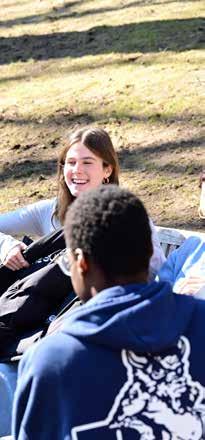


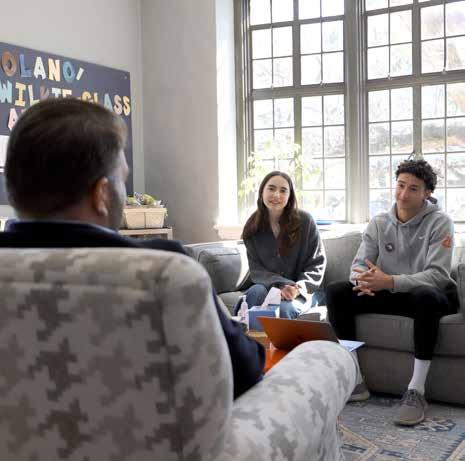
Our class has become more familiar with sophisticated narrative development, camerawork, and editing. I’ve directed, filmed, and edited two documentaries that won top awards at the New York Alliance Film Festival, including “Plucked,” which won Best Documentary Film in 2024 for exploring an annual turkey harvest in my town, the cycle of life, and the farm-to-table movement. Being a film major has been an invaluable experience, allowing me to express myself creatively and to highlight meaningful community stories.
Ellis: Whenever I have free time, I play chess or study. Studying allows me to get ahead on my work, which is crucial on a tight schedule. My favorite place is the library, where I settle into a study carrel for 30 to 45 minutes of good focus.
If I’m not studying, I am leveling up my chess game. This year, I’ve consistently played or studied chess for an hour each day. I am with my friends if neither of those activities are going on. Balancing social life and academics is key, and having breaks during the day to socialize without focusing on work keeps me going.
Ellis: Each day ends with either a sports practice or a game. In the winter season, that means basketball practice. As team captain this year, I’ve emphasized the importance of details, or “the little things,” such as cutting hard, making clean passes, and high-fiving teammates. When it comes to losses, I find our team’s resilience admirable. I’ll play baseball in the spring, and I’m headed off to Colby College next year to continue my baseball career. While I’m still at Fieldston, I am focused on an important goal — winning our baseball NYSAIS championship.
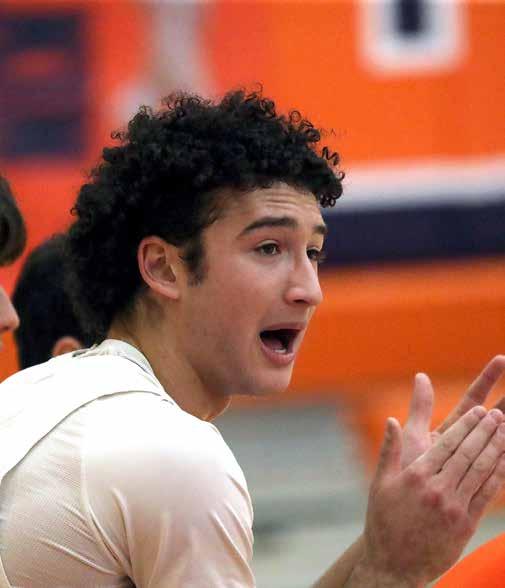
What does life look like for our Eagles after completing their ECFS education? We spoke to five members of the Class of 2024 about their first year in college, exploring new and unexpected opportunities, and what advice they would share with current ECFS students.

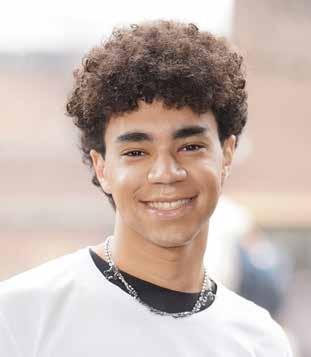
“What
has surprised me the most about college is the importance of trying new things. You should leave your comfort zone, which I did when I joined a sketch comedy club. It ended up being the best thing for me because it opened so many doors, connected me with amazing people, and helped me discover something I’m passionate about. Leaving Fieldston, I knew that I had two passions of writing and film, and I was very surprised to find another one at college. You can build a new life for yourself in college, and that fresh start is really exciting.
At Fieldston, I did what I found joy in, whether being a 2D Art major or doing dance, which led me to my current school. This semester, I took a class called “Law on Reproduction and Sexuality,” and it was very different from anything I intended to major in. Now I’m taking another law class next semester and I’m happy I tried something I wouldn’t normally have. Fieldston also prepared me for college through time management, and my college classes feel similar to my City Semester experience in writing and class discussions.
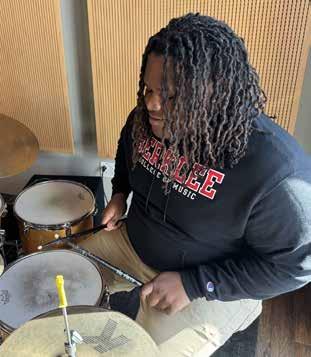
“Trust that what is for you will show up. Don’t put too much weight on what other people think, and just do what is right for you. At Berklee, everyone’s talented, but I found my group of people, my friends, and I’m excited to watch us grow professionally in the next few years. I worked on 35 songs this semester alone, and I think my younger self would be proud of this accomplishment. If I could go back, I would tell him that things start happening quickly, and once you get here, you’re on the right path.
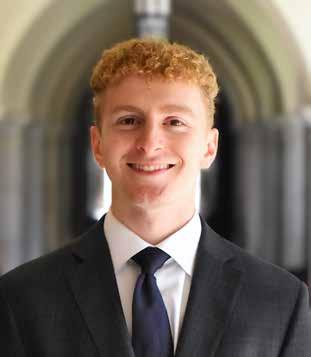
“ I continued doing Mock Trial in college, which has been one of the most fun extracurriculars I’ve been a part of. My firstyear writing seminar, “Being Human,” involved reading texts from philosophy, anthropology, sociology, and more and discussing both what it means to be human and the college experience itself. I found myself more organized and better prepared than many around me, for which I credit Fieldston. College has been a process of exploration, and I’m excited to take classes in completely new departments next semester.

“At Fieldston, I always had someone to turn to, whether that was a friend or a faculty member. The connections I built were crucial to my development, and now I feel more assured of who I am. It’s not that I didn’t know myself before, but I’ve grown into myself in a stronger way. I’m most excited about the opportunities I know are coming. It feels like I have the entire world at my fingertips, and I’m excited to dive in.
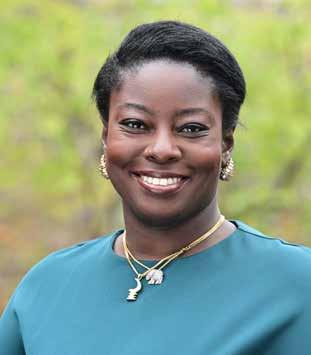
“Through my experience working at a university and hearing from our alumni, one message stands out: Fieldston students feel and are so well prepared for academics at the most rigorous institutions and are well suited to invest in their communities because of what they learned and experienced here at ECFS. From the perspective of a college admissions office, what sets Fieldston applicants apart is not only the depth and breadth of their academic experiences but also the strong sense of purpose and community they carry with them. Former students have cited experiences ranging from City Semester and the Ethics curriculum to community service projects, visual and performing arts, and humanities and STEM coursework. It is not just what we teach but how we teach and the relationships graduates develop with their teachers. This is true from their very first semester of college.
Our alumni are trailblazers, transforming industries and redefining what is possible all around the world. From advances in medicine and engineering to leadership roles at top technology companies and pioneers in sustainability, their achievements are a testament to the power of an ECFS education — one that cultivates curiosity, sharpens intellect, and makes the extraordinary possible.
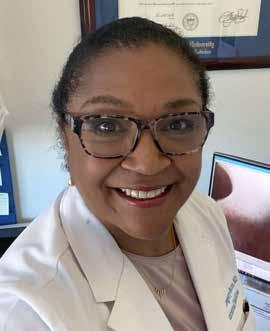
“At Fieldston, our teachers inspired and taught us to think critically and to question and analyze everything.
Retired Physician, Internal Medicine Gina Gregory Burns ’77

Student at Northwestern University, 2024 Glen de Vries Scholar Sam Weinick ’24
“Fieldston’s Science Research Program ignited my passion for merging science and business. I explored lifechanging tech like deep brain stimulation, saw its power firsthand at Mount Sinai, and discovered how innovation can transform lives.
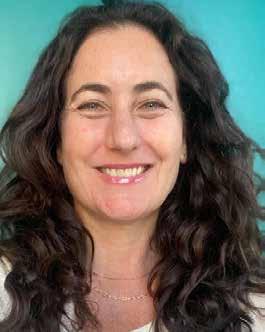
Rachel Hochhauser
’91
“Fieldston taught me how to advocate for others and care deeply for my community. In those classrooms, I was encouraged to stay curious, sparking a lifelong passion for learning that continues to drive me today.
Head of Safety Operations Outreach and Strategic Advisor, Snap Inc.
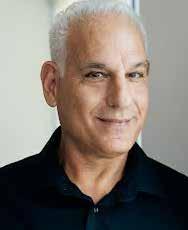
Robert Werthamer ’77
“The Ethics courses at Fieldston taught me to think broadly about the impact of my actions — a perspective that now guides my work, helping buildings move toward net zero and adapt to growing environmental challenges.
Director of Sustainability, Zyscovich Inc.
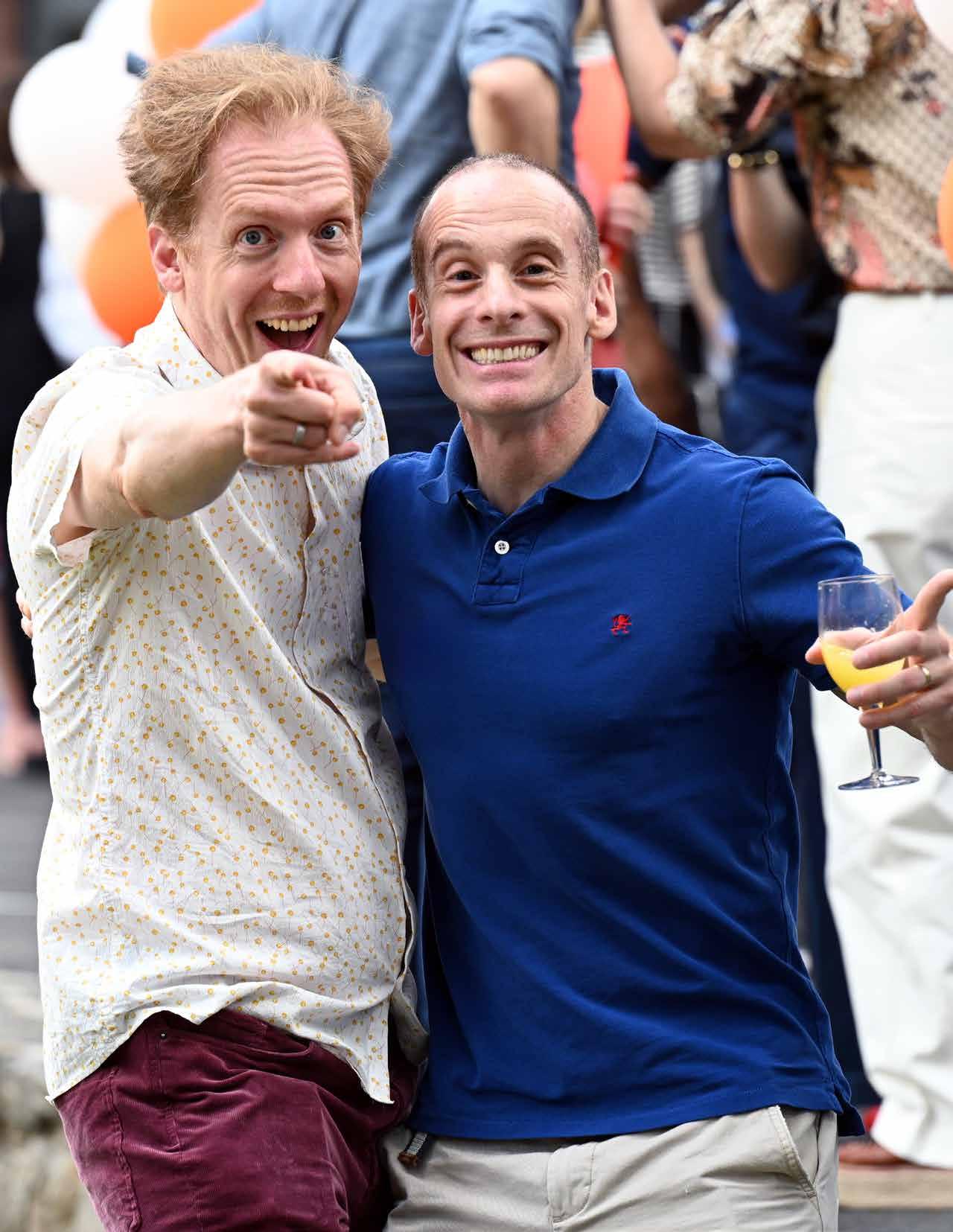
ECFS honors and remembers the alumni we lost.
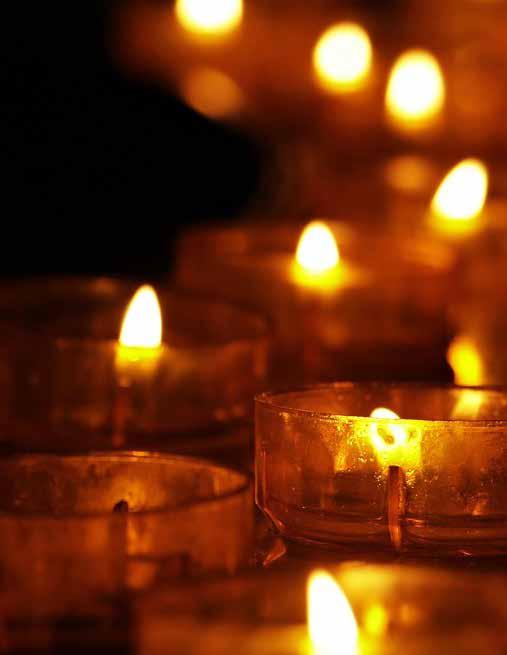
Vincent Aparo ’67
Marty Boykan ’47
Jane Kaufman Chevron ’44
David Cole ’59 (attended through Form III)
Learsi Djivre ’75
Joseph Durso ’75
Reba Goodman ’45
Eileen Hammond ’50
Stella Gluck Hordes ’55
Fred Johnson ’70
Judith Blau Katz ’64
Jon Landau ’78 (attended through Form III)
Barbara Rothschild Michaels ‘42
Ellen Miller ’65
Stuart Minton ’47
Jeremiah Ostriker ’55
Michael Rosen ’58
Barbara Garlan Rosenblum ’52
Joan Moisseiff Scobey ‘44
George Sherman ’49
Alan Lincoln Stuart ’55
Anne K. Silver Switzer ’53
Carla Tscherny ’74
Paula Kreisberg Ulrich ‘54
Lee Warshavsky ’76
This list represents all in memoriam submissions between May 2024 and April 2025. If classmates are missing, please email alumni@ecfs.org so we may honor them.
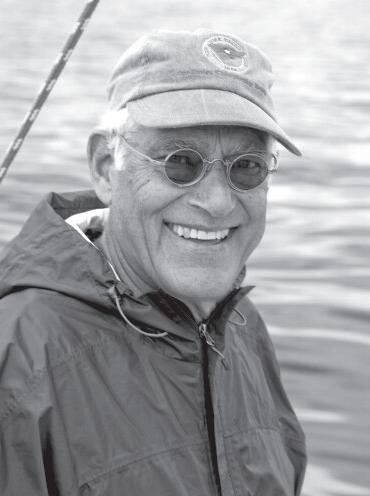
Alan Lincoln Stuart ’55 passed away on August 1, 2024. After ECFS, Alan went on to become a widely respected leader in the investment world. A proud Brown University alumnus, he contributed to athletics, theater renovations, and scholarships. He also lent his expertise to multiple boards, including the Town of Harrison, NY, and the nonprofit Careers through the Culinary Arts Program.
A passionate sailor, Alan enjoyed cruising and racing with family and friends, including four Newport to Bermuda races. His love of culture extended to art and music. He and his wife, Jackie, built an extraordinary art collection, and he even appeared as a supernumerary in “Aida” at the Metropolitan Opera.
He is survived by Jackie, his wife of 63 years; his children, Tori (Rob), Carolyn, and Elizabeth (Skye); and his grandchildren, Isabelle, Madeleine, Maya, and Calder. He also cherished his nieces, nephews, and extended family. Alan lived with passion, humor, and love — his legacy will endure in the hearts of all who knew him.

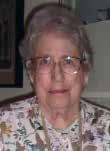
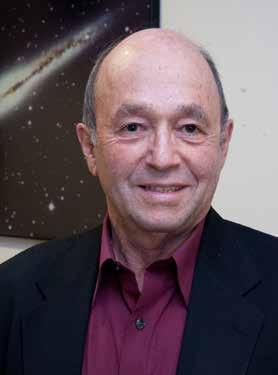
Carla Tscherny ’74 passed away on September 14, 2024. After graduating from ECFS, Carla went on to attend Hampshire College and the Courtauld Institute of Art, ultimately becoming a lifelong New Yorker. Those close to Carla shared that she will be remembered for her distinctive style, her sharp wit, and her creativity in every facet of life.
In memory of Carla, her son, Max Milder ’10, invited a number of ECFS classmates to celebrate her life, including Edward Baum ’74, Bobby Friedman ’74, Rachel Ginzberg ’74, Susan Katz ’74, Peter Pomeranze ’71, Michael Price ’74, Robyn Roth Moise ’74, Jason Schwartzman ’74, Daniel Weitzman ’74, and Susan Weinberg ’74. This was a bittersweet evening. Despite the occasion, it was lovely to share stories and memories. Her many friends will miss her dearly and remember her ability to bring people together at the family brownstone.
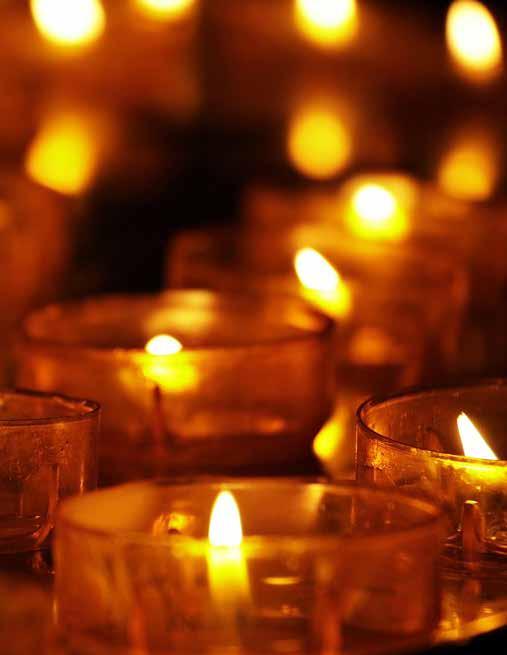
Paula Kreisberg Ulrich ’54 passed away on January 1, 2025. After graduating from ECFS, Paula earned a degree in child development from Antioch College in Yellow Springs, Ohio, and later obtained an MSW in clinical social work from the University of California, Berkeley.
In 1972, Paula and her family immigrated to Canada, settling in the Peers area near Edson, Alberta, as part of the back-to-the-land movement. Once her children were grown, she worked at the Edson Office of Alberta Mental Health before establishing her own private practice, Fireweed Counselling.
She is survived by her husband, Carl; her daughter, Micaela (Scot Morgan); and her son, Jethro (Ania). Paula was a loving grandmother to Randolph Su (Allison), Kai, Erik, Jessica (Drew Sulyma), and Tzvi Cardinal and a proud great-grandmother to Leland, Lavinia, Vesper Su, Milo Su, and Remi Su. She was predeceased by her parents, her brother Michael Kreisberg, and her stepson Benjamin Ulrich. Those who knew Paula shared that Fieldston always held a special place in her heart.
Jeremiah Ostriker ’55 passed away on April 6, 2025. After graduating from ECFS, he attended Harvard intending to study chemistry but soon shifted to physics, drawn by what he called his “cosmic perspective.” He graduated in 1959, then spent a year at the U.S. Naval Research Laboratory before earning his Ph.D. at the University of Chicago, where he studied under future Nobel laureate Subrahmanyan Chandrasekhar. A postdoctoral year at Cambridge brought him into contact with future luminaries like Stephen Hawking and Martin Rees.
In 1965, Jerry joined Princeton, where he remained for 47 years, serving as chair of the astronomy department and as provost. His groundbreaking work reshaped our understanding of galaxy formation, black holes, pulsars, and the fundamental makeup of the universe. Known for his sharp wit, quiet authority, and fearless curiosity, he followed the science wherever it led — and made sure to enjoy the ride.
Jerry is survived by his wife, Alicia Suskin ’55; daughter Rebecca, an editor at The Boston Globe; daughter Eve, an astrophysicist at Princeton; son Gabriel, a data engineer; sister Naomi Seligman ’51; brothers Jon Ostriker ’65 and David Ostriker ’65; and three grandchildren.
Read on to hear self-reported personal news, professional accomplishments, and more from your fellow Eagles! Have an update to share? Send it to alumni@ecfs.org
Joan (Feldman) Kron ’44 has been living in Midtown Miami for two years. She is currently working on her fifth book, a memoir of the 1960s pop art scene featuring figures like Roy Lichtenstein, Robert Indiana, Marisol, and Andy Warhol. Joan shares that Fieldston has played a significant role in her life. At her 25th Reunion, she reconnected with her high school beau, Jerry Marder. They later married and shared 35 years together before his passing in 2005, creating a close-knit blended family.
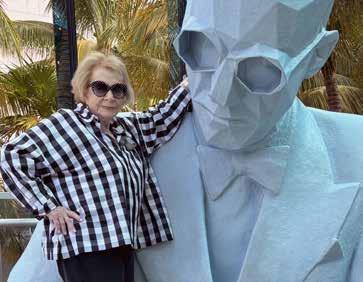
Stephen Wechsler ’45 is still going strong — or, in his words, “honestly, not that strong, but managing with a cane.” He still has great memories of singing “Elijah,” the amazing World Literature course with Dr. Lenrow, and playing footsie under the history room table with the great actress Rita Gam! He is still in Berlin after fleeing McCarthy-era USA in 1952, continues to mail his monthly “Berlin Bulletins,” and is working on another book.
Jack Zimmerman ’49 is still happily living on the Big Island of Hawaii and working in his counseling practice, which explores the connection of intimate relationships among couples. He also enjoys monthly councils with elders (kupunas) and is learning to age more gracefully.
Cora (Rubin) Weiss ’52, activist and social justice leader, has dedicated her life to global humanitarian efforts, advocating peace, disarmament, and gender equality. In 2024, she received Vietnam’s Friendship Medal for her contributions to national independence, unity, and postwar recovery. Chile also honored her for her courageous humanitarian aid, which helped save thousands persecuted under dictatorship.
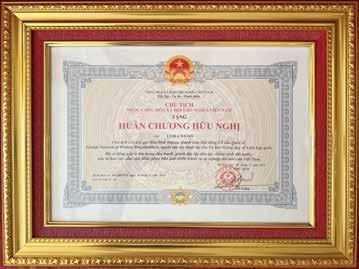
June (Atkin) Sanders ’53 shares that her husband, Kevin Sanders, passed away in April 2022. She lives between the forest and the sea in Maine and is dedicated to preserving Kevin’s legacy as a journalist who left his career as an anchor and reporter to advocate against nuclear weapons. Her artwork is currently exhibited at Snow Gallery, Via Vespucci in Brooklyn.
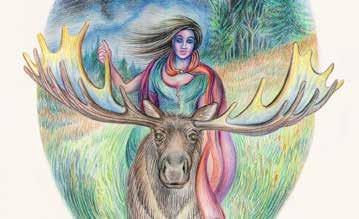
“Riding the Moose,” June (Atkin) Sanders ’53
Michael Nevins ’54 is a retired cardiologist now living in Piermont, New York. His website contains 100 essays, mostly about medical history and Jewish history, information about his 14 published books, and a link to a documentary film that he produced.
Paul Kessel ’55 shares that his first published book of candid street photographs will be shipping in April from Snap Collective in Denmark. In Paul’s words: “Better late than never!”
Alicia Ostriker ’55 has a new poetry collection, “The Holy and Broken Bliss: Poems in Plague Time,” which was published by Alice James Books in October 2024. The poems center on the pandemic and the illness of the body politic, and they are interspersed with poems about her long-sustained marriage to her late Fieldston classmate, Jerry Ostriker ’55
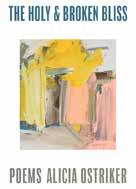
Lois Ullman Berkowitz ’55 and the Class of 1955 look forward to Reunion on campus in June. This is the first time in recent years that a group of alumni requested a 70th reunion — and Fieldston was happy to oblige!
Arthur Roberts ’56 wrapped seven festival films and two miniseries in 2024. In September, he won Best Supporting Actor of the Year at the Independent Shorts Awards International Film Festival.
Richard Schlesinger ’56 graduated from Lafayette College and attended Columbia Law School. After military service, he entered the commercial real estate business, founding his own company. He has three children, two of whom attended Yale and one who went to Stanford, and seven grandchildren. Now retired, he spends winters in Snowbird, Utah, and summers in Maui, Hawaii, with the rest of the year in Pound Ridge, NY. He recently celebrated his 55th wedding anniversary with his wife, Sheila.
Jill Behrens Delbanco ’57 shares that the Class of 1957 has gathered annually for a decade. In October, 20 classmates and partners reunited, wonderfully hosted by Daniel Siff ’57. Each year, attendees contribute toward expenses, with any remaining funds donated to Fieldston. Attendees included Walter Daum ’57, Jill Behrens Delbanco ’57, Tom Delbanco ’57, Margo Zimmerman Fuld ’57, Gail Cherne Gambino ’57, Michael Glass ’57, Irene Halsman ’57, Jane Franzblau Isay ’57, Judy Kleeblatt Christy ’57, Brenda Furman Kreuzer ’57, Elizabeth Lubetkin Lipton ’57, Deanne Rothstein MareinEfron ’57, Pat Weill Park ’57, Linda Lefkowitz Pruzan ’57, Donald Raskin ’57, Mary Ellen Weisl Rudolph ’57, Fred Siegal ’57, Daniel Siff ’57, Jo (Midge) Kanner Spielman ’57, Bob Stein ’57, and Debbi (Sue) Robbins Wolf ’57

Stephanie Bernheim ’58 recently exhibited “Depending on Glass” at A.I.R. Gallery in Brooklyn. The show featured installation, sculpture, and painting, all centered on repurposed glass. Inspired by a storm that shattered a large glass sheet on her farm, she incorporated the shards into her work alongside digital transfers of Polaroids and early mixed-media drawings. Known for her experimental approach, she continues to push the boundaries of material and process.
Julie Adams-Strandberg ’60 hasn’t slowed down, recently helping to establish an arts academy at Hattie Ide Chaffee Nursing Home. Her interdisciplinary dance, music, and drama workshops include five participants over 100 years old. She recently revived a gospel piece she choreographed 25 years ago for Duke Ellington’s centennial. She and her sister Carolyn Adams ’61 also celebrated their philosophy that dance is a cultural birthright at an event titled MiniFest 2025: INHERITANCE.
Ira Hammerman ’60 and his wife, Ellen, sadly lost their youngest son, Yosi, but became great-grandparents the day before his passing. The Class of 1960 shares their condolences and congratulations to them both.
Tom Fisher ’60 lives in Australia and serves on his local government’s Positive Ageing Advisory Committee, where he also leads fitness classes for seniors. While he stays in touch with former colleagues in family mediation and community facilitation, he no longer maintains a professional practice. A former scholar of Chinese history, he occasionally revisits Zen texts in Chinese.
David Kann ’60 recently signed a contract for his second book of poems, “Dreaming Fathers,” set to be released soon.
Doug Lowy ’60 has spent much of his career at the National Cancer Institute, including serving as acting director. His work helped develop the breakthrough HPV vaccine, which has significantly reduced cervical cancer rates worldwide. A recent study from Scotland found no cervical cancer cases in vaccinated women, highlighting the vaccine’s effectiveness — even with a single dose — and offering hope for expanded access in lower-income countries.
Jim Lubetkin ’60 was a multiple award winner at the 2024 New York State Fair baking competitions in Syracuse. Competing in 13 categories over seven days, he earned eight blue ribbons (first place), one white (third place), and four honorable mentions. He also won the “Star of the Day” award for the best overall entry.
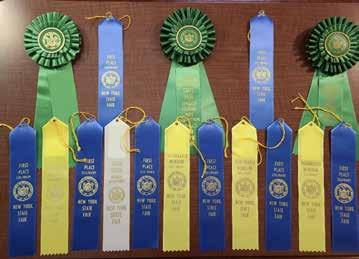
Thalia Pandiri ’60 and Richard Reichbart ’60 continue to practice psychotherapy. Richard maintains a full-time psychology practice in northern New Jersey and has resumed his role as president of his psychoanalytic institute in New York City.
Dan Rottenberg ’60 writes “Contrarian’s Notebook,” a monthly blog featuring insightful and often humorous takes on topics ranging from ECFS memories — spanning the Central Park West and Riverdale years — to the current political climate.
Peter Rutkoff ’60 has been working with his wife, D. Rose Elder, on a project to bring experienced American teachers to rural Ghana’s Upper Volta region, where they collaborate with local educators on projectbased learning — something he picked up at Ethical Culture. He also recently published a novel titled “Pinstripes,” available on Amazon, and the second edition of his novel “Shadow Ball,” about the Negro Leagues, is already in the works.

Carol (Lipson) Wilson ’60 spent the past year traveling to festivals, including the Mongolian Eagle Festival and the Maha Kumbh Mela in India, which occurs once every 144 years — an opportunity she didn’t want to miss. She also bathed in the Ganges with 400 million pilgrims and, thankfully, avoided the crush. She is enjoying her travels and is writing a novel.
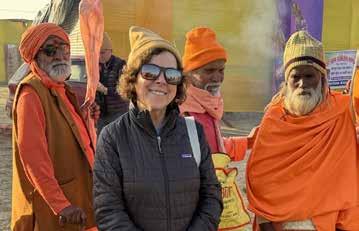
Deborah Berch Kurz ’63 has lived in Sarasota, Florida, for the past five years and enjoys the winters there very much; the summers, not so much! She encourages anyone from the Class of 1963 in the area to reach out.
William F. Knight II ’63 is retired and living in Boston. He’d like to share that he is still in love with the same woman and has not yet won the Nobel Prize. We believe in you, William!
Robin Ostow ’63’s book, “Curating Human Rights: Displaying, Combating and Obscuring Human Rights Violations in Museums,” was published in November 2024 by Routledge.
Nicholas Meyer ’64’s latest book, “Sherlock Holmes and the Real Thing,” will be published in August by Mysterious Press.
Emery Roth II ’64 and his wife, Jane, are enjoying retirement at their home on the Shepaug River in Connecticut, where he spends much of his time hiking and photographing the landscape, architecture, and local industries. Their daughter, Melissa, is the campaign manager for Rep. Jahana Hayes and vice chair of the Kent, CT, Democratic Town Committee. Their son, Emery III, is a sound designer and engineer for the Bushnell in Hartford and the Hartford HealthCare Amphitheater, and their grandson, Aiden, is an engineering student at Bucknell.

Jennifer Tolbert Roth ’64 continues to teach at the City College of New York and the CUNY Graduate Center. She has published “Out of One, Many: Ancient Greek Ways of Thought and Culture” (Princeton, 2024), a cultural history of Greece, and “A Very Short Introduction to Thucydides” (Oxford, 2025). She recently returned from two exhilarating weeks in Egypt. Her granddaughter, Alannah Lejeune, received her doctorate in immunology from NYU in October.
Erica (Schrauer) Linthorst ’65 is proud to be the oldest active U.S. competitor in Taekwondo. She has represented the United States in four World Taekwondo Poomsae Championships, earning medals in each: silver in 2014 (Mexico), gold in 2016 (Peru), silver in 2018 (Taipei), and gold in 2024 (Hong Kong, over-60 female team). She currently serves as a Taekwondo coach at New York University and plays competitive tennis in singles and doubles, including at the national level. She and her husband have three married children and six grandchildren and currently reside in Mount Vernon, New York.
Menachem (Meni) Rosensaft ’66’s latest book, “Psalms: Confronting Adonai after Auschwitz,” was published in January 2025 by Ben Yehuda Press. At the end of August 2023, Meni stepped down from his positions as general counsel and associate executive vice president of the World Jewish Counsel but continues to teach about the law of genocide at Cornell Law School and Columbia Law School, as well as about antisemitism in the courts and jurisprudence at Cornell. He remains in close touch with Robert Fagenson ’66 and Jeff Katz ’66 and remembers his time at Fieldston with nostalgia.
Charles Baum ’67, Jim Pressman ’67, and Richard Ablon ’67 (pictured below) attended the wedding of Jim’s daughter, Kate Pressman ’14, to Julian Herrera at Jim’s house on Long Island.

Shira (SJ) Rozan ’67 published a book this April. “The Railway Conspiracy” is the second in a crime novel series set in 1924 London, following “The Murder of Mr. Ma.”
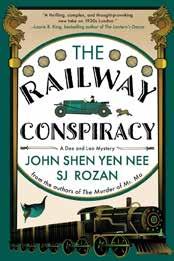
Katrin Belenky Peck ’68 and her husband, Sam Peck ’68, moved back full time to Vero Beach, Florida, in December 2024. Katrin stays in touch with Jayne Dworman Greenwald ’68 and Betsy Ottenberg Cherkasky ’68. She and Sam also traveled to New York City to see “Mystic Familiar,” a new ballet at New York City Ballet choreographed by their son, Justin Peck.
Daniel Brown ’68 is currently exhibiting paintings in two galleries in Taos County, New Mexico. He was featured on the 2024 New Mexico Magazine Artist Calendar. Among his collectors is a former Nobel Peace Prize winner and the great-nephew of President Lyndon B. Johnson. He honors former Fieldston Art Teacher Robert Schwartz for giving him the freedom to explore his youthful creativity.
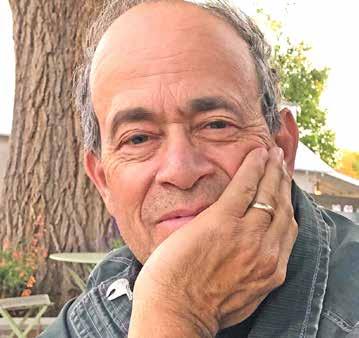
Joan Fenton ’69 recently retired as the coordinator of Blues Week, a summer program she founded in 1983 as part of the Augusta Heritage Workshop. She will continue teaching blues guitar as part of this program, serving on the organization’s board, and will work at her two retail stores in Charlottesville and Williamsburg, Virginia.
Jackie Keveson ’69 spends winters in Savannah, Georgia, and can be found at music jams and open mics. Back up north, Jackie resumes her duties managing The Red Door Thrift Shop in Yonkers, assisting the Youth Economic Group of Hudson Valley-based Rural & Migrant Ministry with its silkscreen operation, and pursuing her musical passions. She is the proud mother of a court officer captain.
Margaret (Peggy) Sapir ’69 enjoys winters in Rincón, Puerto Rico, and warmer months in Wilton, Connecticut, and Vermont. A highlight of 2024 was her son’s wedding in August. Another wedding in June took her to Tuscany, northern Italy, and a bit of Switzerland. She has also been exploring Mexico, visiting Playa del Carmen, Oaxaca, and Puebla. She is happy to have time to learn new sewing, craft, and art skills.
Rick Cohen ’70 is proud to be a coach for the Fieldston boys JV basketball team.
Gary Rediker ’71 and his wife, Phyllis, are enjoying their six grandchildren, playing golf, and traveling the world in retirement. Gary managed to get together with Alan Scheuer ’71 in Florida this past January.
Sheila Bayne ’73 has left Los Angeles after decades and moved to her dream home in the Hudson Valley. She is overjoyed to be back in New York, and her law practice continues at a slower pace. She recently traveled to Turin, Italy, and Perth, Australia, for friends’ celebrations. Best of all, in May, her eldest son was married close to home. She also shares her condolences with dear friends who lost their homes in the Altadena fires.
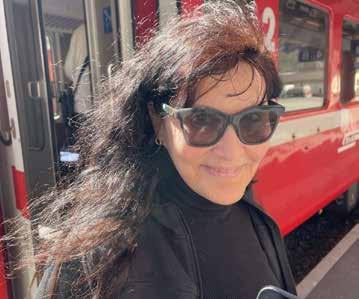
Adam Berg ’73 launched a podcast called “Adam!” which recently dropped its 27th episode. It is available on all podcast platforms and features observations on business and his experiences in that world in 12 minutes.

Adam Berg ’73
Meg Allyn Krilov ’73 was elected to the Bryn Mawr College Alumnae Association Executive Board in recognition of her activities as an alumna. She has spent years interviewing prospective students, finding the conversations engrossing and stimulating while helping to enhance their understanding of the college. In 2019, she and her husband, Hon. James Fogel, endowed the Arthur Krilov Scholarship Fund at Bryn Mawr. She continues to be an enthusiastic choral singer in four different choruses.
Warren Leight ’73 has a new play opening on Broadway titled “Just in Time.” It focuses on the life of Bobby Darin.
Eddie Baum ’74 co-founded and is editorial director of a nonprofit independent community newspaper in Northern Westchester, The Recorder.
Rachel Ginzberg ’74, Robyn Roth Moise ’74, and Ann Stuchiner ’74, members of last year’s Fieldston Reunion Committee, thank the 50 classmates who joined them for their 50th reunion: “It was a fun night of sharing memories and photos, playing trivia, and enjoying ’70s-inspired food,” they said. The celebration continued at a Riverdale bar and a brunch on the Upper West Side. Special thanks to Jason Schwartzman ’74 and Adrienne Aiken ’74 for the soundtrack of a lifetime, Marc Johnson ’74 for the slideshow, and Jeff Eliasoph ’74 for being a fantastic emcee.
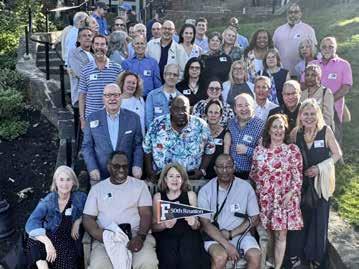
Susan Hinkson ’74, jazz newcomer, has a debut album, “Just in Time,” which arrived buoyantly via Windfall Creations in May 2025 with a spirited set list of standards. She shares, “The goal of this project was pursuing these songs that always spoke to me as a little kid. They’re a part of my soul.” The album features jazz legends Bruce Barth on piano, alto saxophonist Steve Wilson, Vicente Archer on bass, and Adam Cruz on drums. It is available on all streaming platforms.

Rodney Jones ’74, a celebrated composer, was named a 2024 Guggenheim Fellow.
Steven Levi ’74, his wife, Laura, and their beloved Cosmo moved to San Ramon, California, in February after 38 years on the Upper West Side to begin the next phase of his life and to be close to their daughter, son-in-law, and granddaughter. He shared that although he misses New York City, he loves his new home and surroundings.
Robyn Roth Moise ’74 shares that her late father, architect Richard Roth Jr. ’52, often spoke of writing a book. Before his passing, she began working with him on essays about his career at the renowned firm Emery Roth & Sons. Though he never wrote his autobiography, his life and work are now documented in “Behind the Curtain Wall,” a series with Untapped New York Tours based on exclusive interviews. Cowritten with Jo Holmes, the essays explore his designs and personal stories. Untapped New York will release one essay per month, with Robyn developing virtual talks to accompany some of them.

G. Angela Flemister Henry ’75 was appointed a board trustee of The Community Foundations of the Hudson Valley. A Dutchess County resident, G. Angela is an accomplished actor, voiceover artist, and fundraising emcee with a strong philanthropic background, including roles at the International Women’s Health Coalition and CARE. She currently serves as executive director of the Poughkeepsie Public Schools Foundation.
Nina Korelitz Matza ’75 and her sister Jean Hanff Korelitz ’79, founders of Dot Dot Productions, staged an adaptation of “The Dead” (1904) by James Joyce at the Irish Repertory Theatre.
Gina Gregory Burns’77 recently retired after nearly 35 years in internal medicine at Kaiser Permanente in San Francisco, where she collaborated with colleagues to create programs for underserved populations. She has now assumed the role of Board Chair for the YMCA of Greater San Francisco. Gina lives in San Mateo, CA, with her husband, Derrick Burns, a Principal Software Architect at Salesforce. Their daughter, Maya, works at McKinsey & Co. in Los Angeles, while their son, Jamil, runs Raised Roots, a farming business in Sunol, CA. Gina stays in touch with fellow Fieldston peers and most recently had dinner with Dayna Bowen Matthew ’77
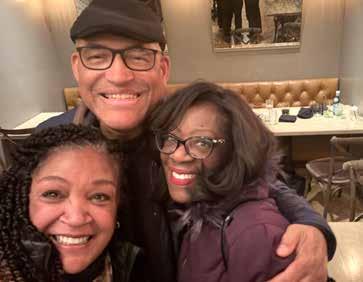
Leslie Goldsmith Carroll ’77 headed to Las Vegas in June to present a panel with Kate Quinn, Margaret George, and Sophie Perinot at the 10th North American Historical Novel Society Conference, titled “Something Wicked This Way Comes: Writing the Antagonist in Historical Fiction.”
Lisa Dabek ’78 is honored to be among the six finalists for the Indianapolis Prize on behalf of the Tree Kangaroo Conservation Program and Woodland Park Zoo community-led conservation work in Papua New Guinea. Lisa shared, “The YUS Conservation Area, the people of YUS, and the tree kangaroos, are my heart.” Each DeHaan Finalist has dedicated their career to wildlife conservation, creating lasting change through innovative solutions and community engagement.
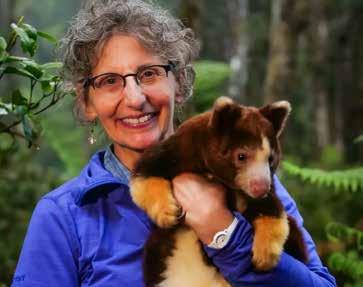
Bill Sage ’78 continues to teach and do health policy work as founding faculty director of Texas A&M’s Institute for Healthcare Access and was recently named a University Distinguished Professor, the highest achievement a faculty member can earn.
Julie D. Taylor ’78 celebrated the 30th anniversary of her Los Angeles-based firm, Taylor & Co. The firm provides marketing and public relations services to global clients in the architecture, design, construction, and furniture industries. Julie is on the National Advisory Board of USModernist and an honorary member of the American Institute of Architects (the highest honor given to a nonarchitect).
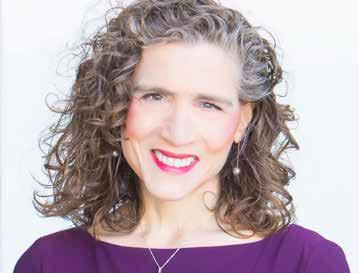
Jason Flom ’79 got engaged to Khaliah Ali, daughter of Muhammad Ali, in Southern California last week after more than a year of dating. Ali told PEOPLE that her fiancé’s proposal took her entirely by surprise. “Even with all of the amazing work he does, he may be missing his calling because he was so stealthy he could be in the Secret Service!” she joked.
Alice Jankell ’79 became the new Artistic Director of Philipstown Depot Theatre in Garrison, New York, this past fall. She spends half the week in the city and the other half in the Hudson Valley and invites
everyone to check out the 2025 Season at the Depot, a beautiful train ride up the river!
Anthony Howell ’81 is a dance teaching artist who serves as a Cultural Ambassador to Havana, Cuba, and Rio de Janeiro, Brazil.
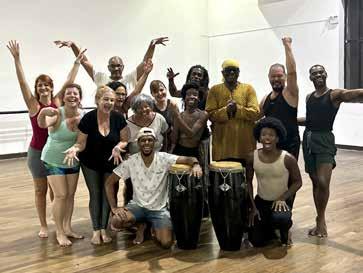
1982
Jonathan Skurnik ’82 shares that his mother’s passing in 2023 brought home his mortality in a deeper way, inspiring him to pursue a lifelong dream of attending art school. After nearly 30 years as a documentary filmmaker, Jonathan is now one year into his MFA program in studio art at Cal State LA and is absolutely loving it. His love for creativity stems from his ECFS experience — from developing black-andwhite film in 2nd Grade to a ceramics class in Fieldston Upper — for which he is deeply grateful.
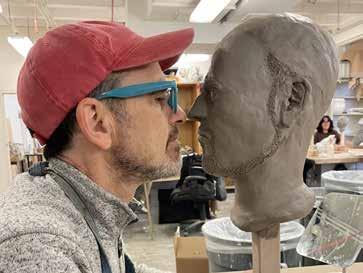
Jonathan Skurnik ’82
1983
Oren B. Helbok ’83 has a traveling exhibition of photographs, “Railroading: The Hardware, the Landscape, and the People.” It has appeared at 15 venues since late 2018, with a 16th scheduled this spring at the Hazleton, Pennsylvania, Art League’s Hayden Family Center for the
Arts. The photos in the exhibition, along with more of Oren’s work, can be viewed at wheresteamlives.net.

Jonathan Rosand ’84 and his team developed the Brain Care Score with patients and practitioners as a simple tool to help lower the risk of dementia, Alzheimer’s, stroke, and depression. In September, The New York Times released an online version of the score. Jonathan has since launched the Global Brain Care Coalition to help communities worldwide adapt and integrate the tool while tracking the development of these conditions over time.
Melinda Beck ’85 was awarded a silver medal by the Society of Illustrators. The winning image was part of a pair of posters for the South Korean National Museum of Democracy and Human Rights. About women’s rights, Melinda said that “both posters pose the question: Is a country truly democratic if half of its citizens are subjected to laws that restrict their basic human right of freedom over their own bodies?”
Tracey Bing ’87, Reiko Hillyer ’87, and Eden Wurmfeld ’87 collaborated on a documentary about Reiko’s Inside-Out Prison Exchange class. Reiko brings Lewis & Clark students to study crime and punishment alongside incarcerated students at Columbia River Correctional Institution. Filmed by Emmy-nominated director Eden and executive produced by Tracey, the project was supported by their ECFS classmates and premiered in April at Aspen Shortsfest. Reiko’s teaching also inspired her book “A Wall Is Just a Wall,” a finalist for the Oregon Book Award and featured on CNN.
Jeffrey Goins ’87 continues to enjoy his work as a Villa Specialist in the beautiful St. Barth.
Allison Gilbert Weintraub ’88 was honored to co-author Dr. Ruth Westheimer’s final book, “The Joy of Connections: 100 Ways to Beat Loneliness and Build a Happier and More Meaningful Life.” Allison is a sought-after speaker, TV personality, and podcast guest, offering insights into building greater connections within families, communities, and the workplace.
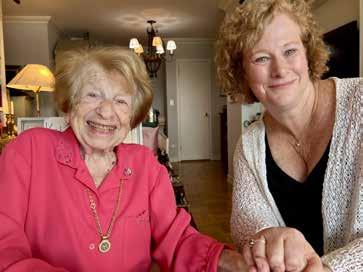
Robert Tucker ’88 has been appointed FDNY commissioner. A longtime supporter of the department, he serves on the FDNY Foundation board and has maintained ties to the FDNY for decades, despite never serving as a firefighter. A self-described “fire buff,” he says his passion for the field began in childhood.
Douglas F. Williamson ’92 launched his solo consultancy, Bridge6, in late 2024. The business offers coaching, process facilitation, meeting and event management, and advising on complex collaboration initiatives. True to his expertise, Douglas focuses on intercultural challenges, sustainability, and human empowerment.
Mariko Silver ’95 was welcomed as the next President and CEO of Lincoln Center for the Performing Arts in September 2024. Mariko said that she wanted more people to experience Lincoln Center’s offerings. “The opportunity of stepping onto the Lincoln Center campus,” she said, “should be available to everyone.”
Nicole Isaac ’96 was appointed to the President’s Commission on White House Fellowships. As Cisco’s vice president of global public policy, she leads the company’s worldwide policy agenda. With over 20 years of experience in the government, corporate, legal, and nonprofit sectors, she also founded Code the Streets, a social impact accelerator that advances tech resources in inner-city communities.
Flannery Houston ’99 is the Chief Program Officer at Rise, a nonprofit organization that trains grassroots organizers to pass laws that directly impact the communities they serve. She leads the program that works to pass legislation protecting the rights of sexual assault survivors throughout the United States. She lives in Austin with her husband, Stephen, and their pup, Whiskey.
Joey Mintz ’99 co-founded Siponey, a cocktail company that uses all real ingredients and avoids “natural flavors.” Inspired by the classics with a better-for-you approach, the company recently launched a nonalcoholic lineup available in select metro New York City retailers.
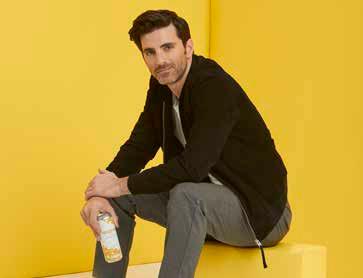
Romy Silver-Kohn ’99 co-edited the publication “Inventing the Modern: Untold Stories of the Women Who Shaped the Museum of Modern Art,” which was published this fall, and co-organized the exhibition “Lillie P. Bliss and the Birth of the Modern” at MoMA.
Abe Streep ’00 published “The Golden Boys of Nyack” in New York Magazine. He is the author of “Brothers on Three,” an award-winning book about basketball and community on Montana’s Flathead
Indian Reservation. A recipient of the 2019 American Mosaic Journalism Prize, his writing has been featured in “The Best American Sports Writing” and “The Best American Essays.” He has also taught at the Lighthouse Writers Workshop, Bread Loaf, and the University of Wyoming.
Alison Hashmall ’02 welcomed a second child, Alexander James, in 2024.

Aaron Gibralter ’03, his wife Natalie, and their two children, Leo and Rachel, live on the Upper East Side. He has continued his career in technology startups and is currently the head of engineering at mighty.com, a legal tech company. Leo is in 2nd Grade at Hunter Elementary, and Rachel is in Kindergarten at Dalton.
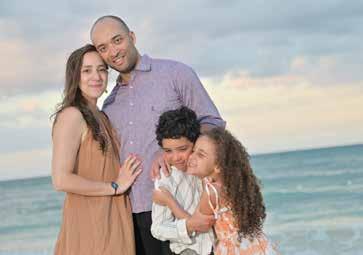
Kira Ackerman ’06 released her debut feature documentary, “Hollow Tree.” The film follows three teenagers coming of age in Louisiana. Their different perspectives — as Indigenous, white, and Angolan young
women — shape their story of the climate crisis. “Hollow Tree” won a Jury Prize at its premiere at the New Orleans Film Festival and an award for Best Documentary at Chicago’s International Children’s Festival. Chachi Hauser ’09 produced the film.
Crystal Gayle ’08, Ph.D., has a thriving private mental health practice in Dallas. She specializes in treating OCD, anxiety, and related disorders and also focuses on trauma and clients’ challenges. Her practice conducts psychoeducational assessments for ADHD and mood disorders, and she supervises doctoral-level trainees.
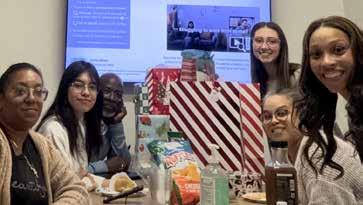
Allison Flom ’12 wrote the ECFS Fall Drama titled “Trash or Stories.” It features Martha Epstein ’14 and Samantha Dascher ’06, with a set designed by Emmie Finckel ’10. It was performed by Fieldston Upper students this past fall.
Matt Gottesfeld ’12 co-produced the documentary “One South: Portrait of a Psych Unit,” currently streaming on Max. The film’s director of photography was Justin Zweifach ’07
Danielle Stadler ’12 was married to Jake Axelrod ’12 on January 11, 2025.

Maxwell Beer ’14 is the lead producer of “Cellino v. Barnes,” a hit off-Broadway play that ran from July 2024 to spring 2025. His high school best friend, Rohit Gopal ’14, is a co-producer of the production. The two are also co-producers of the new Broadway musical “Maybe Happy Ending,” currently running at the Belasco Theatre.

Sydney Beres ’14, daughter of John Beres ’81 (former alumni board chair and former trustee) and Diane Lewis ’81, was married to Nate Pajka on August 10, 2024. There were 16 alumni in attendance. Sydney was on the faculty at Fieldston Lower for several years.
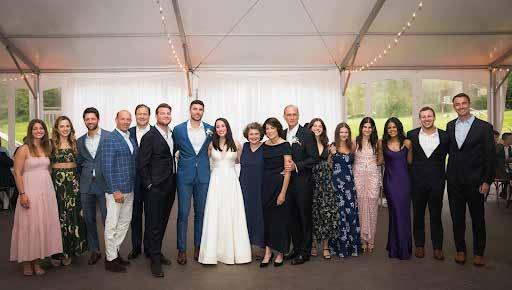
Sydney Beres ’14 at her wedding with fellow
Kate Pressman ’14, daughter of Jim Pressman ’67, was married to Julian Herrera on September 21, 2024. Several alumni from the Class of 1967 were also present.
Ben Fitts ’15, a Brooklyn-based author and musician, published a collection of short stories with Alien Buddha Press, “The Earth No Longer Exists.” Blending elements of magic realism, bizarro, and literary fiction, Ben explores the absurdity of the universe with results that are as chilling as they are hilarious.
Victoria Smith ’16 is the drummer for War Honey, an indie rock band based in Brooklyn that is currently signed to
Handstand Records. The band was formed in 2019 by vocalist Gabrielle Dana and guitarist Ben Fitts ’15 and has been described by Razorcake Magazine as “an almost transcendent experience.” War Honey has released two EPs and two singles, all of which have received positive press and radio airplay/streaming, accumulating hundreds of thousands of streams combined.
Noah Parnes ’17 wrote the ECFS Studio Series #1 play this year, “Rosehip Lane.” It was performed by Upper School students in October.
MJ Quintana-Rodríguez ’20 will marry Nathaniel Holen this upcoming November in Portland, Oregon.
Max Frei ’24 was named the Men’s Basketball Rookie of the Week at Bard College in December.
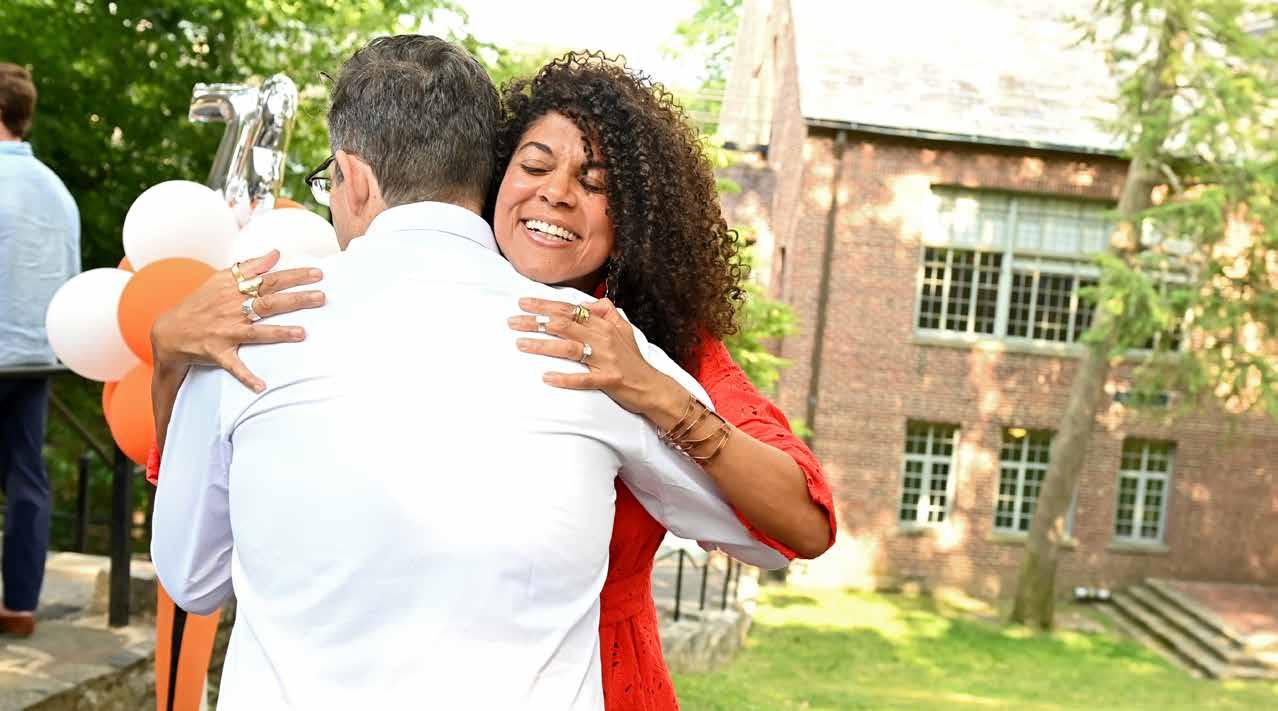


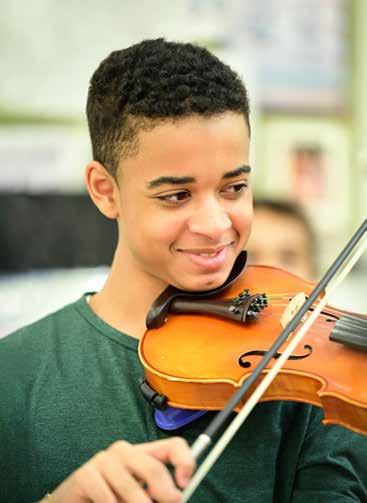
The ECFS Orange Fund is the heart of our School, fueling the vibrant stories showcased in this magazine. The Orange Fund sustains all areas of the School: ethical and innovative academics, inspired visual and performing arts, transformational athletic opportunities, dedicated faculty and staff, and so much more.
By making a gift to ECFS, you’re supporting the 1,650+ students, 400+ faculty and staff, 2,400+ parents and guardians, and 10,000+ alumni who make ECFS unique. Giving back to ECFS is simple and impactful.
Donate stock effortlessly with our online tool, set up a sustaining monthly gift for ongoing support, or double your contribution with our enhanced employer match program. Your philanthropic support, at any level, demonstrates a shared commitment to our mission and invests in the future of our students.
Are you ready to be a part of it by supporting the Orange Fund? Visit www.ecfs.org/support or scan the QR code to give now.
Whether you’re a current parent, alum, or grandparent, volunteering is a meaningful way to stay connected to ECFS. From supporting the Orange Fund and Admissions to serving as an alumni class recorder or helping with P+T events, there are many ways to share your time and talents. Email orangefund@ecfs.org or scan the QR code to learn more and get started.
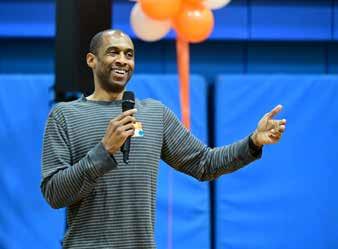
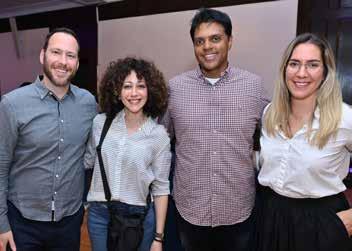


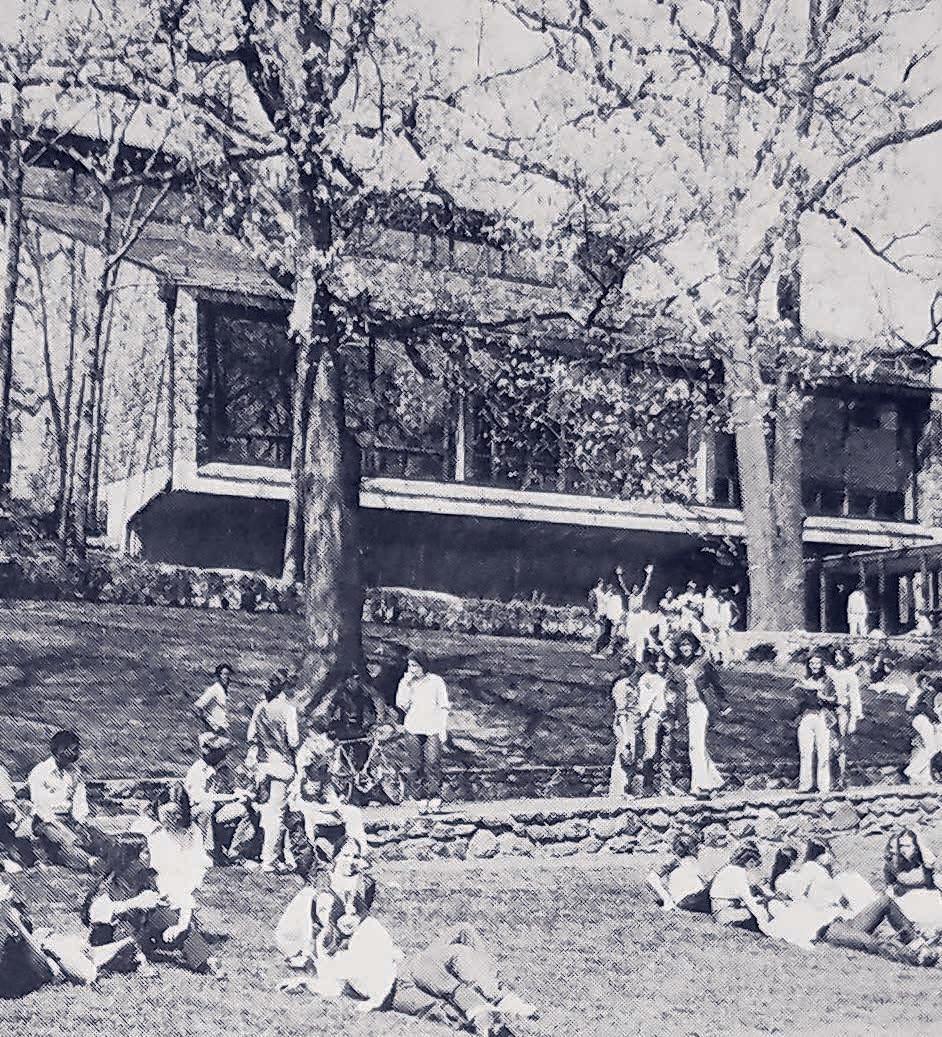

Including ECFS in your estate planning ensures the ethical values and education that shaped you will endure for generations to come. Since 1878, ECFS has been a beacon of progressive education grounded in ethical values. By making a planned gift, you will sustain this tradition of excellence for the next 150 years and continue the story of our School. Let your legacy inspire.
For more information on including ECFS in your will or trust or to share your plans so that we may express our gratitude and recognize you, please contact Stephanie Pilla, Associate Director of Leadership Giving & Strategic Engagements, spilla@ecfs.org / 212-712-6242


